


spring 2023 1 spring2023
THan words LOUDER THan words LOUDER THan words LOUDER THan LOUDER THan words LOUDER THan words LOUDER THan words LOUDER
THan words LOUDER THan words LOUDER THan words LOUDER THan words LOUDER THan words LOUDER THan words LOUDER THan words
LOUDER THan words LOUDER THan words LOUDER THan words LOUDER
THan words LOUDER THan words LOUDER THan words LOUDER THan words LOUDER THan words LOUDER THan words LOUDER THan words
LOUDER THan words LOUDER THan words LOUDER THan words LOUDER
THan words LOUDER THan words LOUDER THan words LOUDER THan words LOUDER THan words LOUDER THan words LOUDER THan words
LOUDER THan words LOUDER THan words LOUDER THan words LOUDER
THan words LOUDER THan words LOUDER THan words LOUDER THan words LOUDER THan words LOUDER THan words LOUDER THan words
LOUDER THan words LOUDER THan words LOUDER THan words LOUDER
THan words LOUDER THan words LOUDER THan words LOUDER THan words LOUDER THan words LOUDER THan words LOUDER THan words
LOUDER THan words LOUDER THan words LOUDER THan words LOUDER THan words LOUDER THan words LOUDER THan words LOUDER THan words LOUDER THan words LOUDER THan words LOUDER THan words
LOUDER THan words LOUDER THan words LOUDER THan words LOUDER
THan words LOUDER THan words LOUDER THan words LOUDER THan words LOUDER THan words LOUDER THan words LOUDER THan words
LOUDER THan words LOUDER THan words LOUDER THan words LOUDER
THan words LOUDER THan words LOUDER THan words LOUDER THan words LOUDER THan words LOUDER THan words LOUDER THan words
LOUDER THan words LOUDER THan words LOUDER THan words LOUDER
THan words LOUDER THan words LOUDER THan words LOUDER THan words LOUDER THan words LOUDER THan words LOUDER THan words
LOUDER THan words LOUDER THan words LOUDER THan words LOUDER THan words LOUDER THan words LOUDER THan words LOUDER THan words LOUDER THan words LOUDER THan words LOUDER THan words
LOUDER THan words LOUDER THan words LOUDER THan words LOUDER THan words LOUDER THan words LOUDER THan words LOUDER THan words LOUDER THan words LOUDER THan words LOUDER THan words
LOUDER THan words LOUDER THan words LOUDER THan words LOUDER THan words LOUDER THan words LOUDER THan words LOUDER THan words LOUDER THan words LOUDER THan words LOUDER THan words
LOUDER THan words LOUDER THan words LOUDER THan words LOUDER THan words LOUDER THan words LOUDER THan words LOUDER THan words LOUDER THan words LOUDER THan words LOUDER THan words
LOUDER THan words LOUDER THan words LOUDER THan words LOUDER THan words LOUDER THan words LOUDER THan words LOUDER THan words LOUDER THan words LOUDER THan words LOUDER THan words
LOUDER THan words LOUDER THan words LOUDER THan words LOUDER THan words LOUDER THan words LOUDER THan words LOUDER THan words LOUDER THan words LOUDER THan words LOUDER THan words
LOUDER THan words LOUDER THan words LOUDER THan words LOUDER THan words LOUDER THan words LOUDER THan words LOUDER THan words LOUDER THan words LOUDER THan words LOUDER THan words
LOUDER THan words LOUDER THan words LOUDER THan words LOUDER
THan words LOUDER THan words LOUDER THan words LOUDER THan words LOUDER THan words LOUDER THan words LOUDER THan words
LOUDER THan words LOUDER THan words LOUDER THan words LOUDER
THan words LOUDER THan words LOUDER THan words LOUDER THan words LOUDER THan words LOUDER THan words LOUDER THan words
LOUDER THan words LOUDER THan words LOUDER THan words LOUDER
THan words LOUDER THan words LOUDER THan words LOUDER THan
2 spring 2023
THan words LOUDER THan words LOUDER THan words LOUDER THan words
LOUDER THan words LOUDER THan words LOUDER THan words LOUDER
THan words LOUDER THan words LOUDER THan words LOUDER THan words LOUDER THan words LOUDER THan words LOUDER THan words
LOUDER THan words LOUDER THan words LOUDER THan words LOUDER
THan words LOUDER THan words LOUDER THan words LOUDER THan words LOUDER THan words LOUDER THan words LOUDER THan words
LOUDER THan words LOUDER THan words LOUDER THan words LOUDER
THan words LOUDER THan words LOUDER THan words LOUDER THan words LOUDER THan words LOUDER THan words LOUDER THan words
LOUDER THan words LOUDER THan words LOUDER THan words LOUDER
THan words LOUDER THan words LOUDER THan words LOUDER THan words LOUDER THan words LOUDER THan words LOUDER THan words
LOUDER THan words LOUDER THan words LOUDER THan words LOUDER
THan words LOUDER THan words LOUDER THan words LOUDER THan words LOUDER THan words LOUDER THan words LOUDER THan words
LOUDER THan words LOUDER THan words LOUDER THan words LOUDER THan words LOUDER THan words LOUDER THan words LOUDER THan words LOUDER THan words LOUDER THan words LOUDER THan words
LOUDER THan words LOUDER THan words LOUDER THan words LOUDER
THan words LOUDER THan words LOUDER THan words LOUDER THan words LOUDER THan words LOUDER THan words LOUDER THan words
LOUDER THan words LOUDER THan words LOUDER THan words LOUDER
THan words LOUDER THan words LOUDER THan words LOUDER THan words LOUDER THan words LOUDER THan words LOUDER THan words
LOUDER THan words LOUDER THan words LOUDER THan words LOUDER
THan words LOUDER THan words LOUDER THan words LOUDER THan words LOUDER THan words LOUDER THan words LOUDER THan words
LOUDER THan words LOUDER THan words LOUDER THan words LOUDER THan words LOUDER THan words LOUDER THan words LOUDER THan words LOUDER THan words LOUDER THan words LOUDER THan words
LOUDER THan words LOUDER THan words LOUDER THan words LOUDER THan words LOUDER THan words LOUDER THan words LOUDER THan words LOUDER THan words LOUDER THan words LOUDER THan words
LOUDER THan words LOUDER THan words LOUDER THan words LOUDER THan words LOUDER THan words LOUDER THan words LOUDER THan words LOUDER THan words LOUDER THan words LOUDER THan words
LOUDER THan words LOUDER THan words LOUDER THan words LOUDER THan words LOUDER THan words LOUDER THan words LOUDER THan words LOUDER THan words LOUDER THan words LOUDER THan words
LOUDER THan words LOUDER THan words LOUDER THan words LOUDER THan words LOUDER THan words LOUDER THan words LOUDER THan words LOUDER THan words LOUDER THan words LOUDER THan words
LOUDER THan words LOUDER THan words LOUDER THan words LOUDER THan words LOUDER THan words LOUDER THan words LOUDER THan words LOUDER THan words LOUDER THan words LOUDER THan words
LOUDER THan words LOUDER THan words LOUDER THan words LOUDER THan words LOUDER THan words LOUDER THan words LOUDER THan words LOUDER THan words LOUDER THan words LOUDER THan words
LOUDER THan words LOUDER THan words LOUDER THan words LOUDER
THan words LOUDER THan words LOUDER THan words LOUDER THan words LOUDER THan words LOUDER THan words LOUDER THan words
LOUDER THan words LOUDER THan words LOUDER THan words LOUDER
THan words LOUDER THan words LOUDER THan words LOUDER THan words LOUDER THan words LOUDER THan words LOUDER THan words
LOUDER THan words LOUDER THan words LOUDER THan words LOUDER
THan words LOUDER THan words LOUDER THan words LOUDER THan
spring 2023 3
editor’s note editor’s note editor’s note
flash five flash five flash five
investigativeinvestigativeinvestigative
4 spring 2023
newsnewsnews
spring 2023 5 arts & entertainment arts & entertainment arts & entertainment fashionfashionfeaturefeature fashion feature sportssportssports opinionsopinionsopinions
A mentor of mine once told me to be an “I’ll do it” person. Three little words when you look at them on the page, but the actions attached to them — what can be applied and accomplished because of them — pack more of the punch.
As an undergraduate student at Marquette, I have spent most, if not all of my time, reading and critiquing the words of others. And this may seem like the atypical English Literature major thing to say, but while it may seem like the opposite is true, words only tell half of the story. And quite honestly, words suck.

No matter how much emotion and dedication you channel into writing meaningful and purposeful words on a page, they can never truly express the complexities of what a person is thinking in their head and what they are trying to convey to their readers.
For example, while what I am writing to you now is a few opening words to introduce and express my thoughts on this magazine that you are about to read, there is little to no possibility that the sense of immense pride and level of fulfillment that I have for this moment is being felt by you in the same way that I am expressing it. You probably can’t read the smile on my face or see the teary eyes I pause to wipe between paragraphs. And why is that?
Because words and meanings are subjective.
One simple text message saying “I love you” isn’t the same as a gesture of an all-encompassing embrace or earth-shattering kiss. Likewise, being a person that says “I’ll do it” and being an “I’ll do it” person are two entirely different things.
We live in a world today that is riddled with he-said/ she-saids, half-baked promises and false truths. By and large, we are surrounded by leaders who find it easier to sit in their glass castles, serenading assurances to bring about unity, equality and justice for all. They promise to initiate change in the places in society that need it most, and yet, the silence of their inaction is deafening.
And while there are those that speak out against inaction and injustice, it seems to me that while calling into a megaphone amplifies your voice, it is the presence of others marching in solidarity that truly speaks louder than any words you could say.
It was from this notion of presence that “Louder Than Words” came to be.
“Louder Than Words,” more than an idea or theme, is about the energy and unity that comes from action. Human beings have the power to express ideas and create meaning in ways larger than spoken or written word.
The fluidity of movement in contemporary dance, the controlled discipline of taekwondo martial artists, the familial connection of a late-night custodial shift — these stories are more than quotes and attributions, they are more than what can visually be discerned.
With all of this being said, you are still about to read
a magazine comprised of thousands of words. Ironic, I know, as I have just spent a decent amount of time telling you that words are insignificant and actions carry more meaning, but I implore you to read them, still.
Whether or not the words on the page move you in some way, my hope is that you will read these stories through the lens of the actions behind them and discover something that you hadn’t considered before. What that “something” is, I couldn’t tell you because as I have also said, words and meanings are subjective.
To the Marquette Wire staff: Thank you for your diligence and dedication to making this issue of the Journal a reality. I am honored to laugh, learn and work beside you and I am inspired by your hunger to produce great journalism day in and day out. I know big things are coming for you all. Remember: “If you can dream it, you can do it.”
To all, I will leave you with this: They say that “Actions speak louder than words,” and I would like to agree with them, whoever “they” are. Actions create change while words create noise. But why create noise when you can create music? And why say “I’ll do it” when the action of the words speaks so much louder?
Sincerely,
Kimberly E. Cook Managing Editor of the Marquette Journal
Editor’s Note 6 spring 2023
executive director of the marquette wire
andrew amouzou
managing editor of the marquette journal
kimberly cook
EDITORIAL
editor of diversity & inclusion
hope moses
executive editors
julia abuzzahab, skyler chun, izzy fonfara drewel, john leuzzi, kirsten lyons
assistant editors
hannah hernandez, phoebe goebel, jolan kruse, ava mares, lauren puthoff, sophia tiedge, kaylynn wright
copy chief
emily reinhardt
copy editors
jack connelly
maeve nolan
contributing writers
jack albright, trinity burgess, aiyona calvin, kevin fitzpatrick, isabella flores, john gunville, trevor hilson, erin howard, emma kroll, clara lebrón, briana nelson, krisha patel, trinity zapotocky
CONTENT content coach
tj dysart
executive social media producer
nancy flaherty
assistant social media producer
meghan oeste
ADVERTISING
account executive
maggie kemp
DIGITAL
general manager of mutv
sarah richardson
general manager of mur
emily bittman
executive producers
caroline bennett
tim littau
kristin parisi
assistant producers
kiley brockway, adrian fraga, andrew hubbach, grace lambertsen
assistant radio general manager
emily sacco
audio producers
jackson gross, jayna hogan-white, india lock
music director
rashad alexander
assistant music director
sam baughn
CREATIVE
design chief
lily werner
executive photo editor
isabel bonebrake
designers
kendal bell, serena pace, erin schneider photographers
katie craig, alex debuhr, forster goodrich, keifer russell
spring 2023 7

8 spring 2023
Two seagull shadows and a reflection are projected from the side of Chase Tower along Michigan St. March 14, 2023.

spring 2023 9
photo KEIFER RUSSELL

10 spring 2023

spring 2023 11
The Skyline of Milwaukee can be seen from the Potowatomi Club in Fiserv Forum March 4, 2023.
photo ALEX DEBUHR

12 spring 2023
Fiserv Forum can be seen from a bridge over Interstate 43 during a clear-skied Sunday Feb. 26, 2023.

spring 2023 13
photo KATIE CRAIG
 Balconies overlook the Milwaukee Riverwalk and the Milwaukee River in the Third Ward district of the city March 9, 2023.
Balconies overlook the Milwaukee Riverwalk and the Milwaukee River in the Third Ward district of the city March 9, 2023.
 photos FORSTER GOODRICH
photos FORSTER GOODRICH

16 spring 2023
The Milwaukee Pierhead Lighthouse stands vacant on the shores of Lake Michigan during a windy afternoon March 3, 2023.
photo ISABEL BONEBRAKE

spring 2023 17
first to
words
ANDREW AMOUZOU
cross the stage
From the eager buzz of excitement from friends and family to the soon-to-be graduates clothed in gowns with a variety of colorful stoles, cords, tassels and cap decorations, some see graduation as a rewarding date on the calendar. For others, it’s just another reminder of adulthood fast approaching.
For Marquette University’s 2023 commencement ceremony, graduates are guaranteed just four tickets to give to loved ones. However, no matter the number of tickets, some graduates believe the impact of the moment reaches far more than themselves and the people they bring.
Just ask senior in the College of Health Sciences, James Hightower, who is pursuing a career as a neurosurgeon.
“Growing up I always liked (studying) the body and I liked the idea of surgery,” Hightower says. “A lot of times you’re told of how rigorous it is to become a doctor and how long the path is and how not many people can make it.”
Hightower has not had many Black doctors to look up to either. Black people make up over 13% of the U.S. population, but roughly 5% of all doctors are Black, according to a 2018 study from the Association of American Medical Colleges.
The lack of representation and mentorship led Hightower to choose to major in business — a major that Hightower says resulted in a boring academic experience to start.
Hightower cites his sister Jamie, who is a Marquette alum, and Dr. Abdul-Ghaffaar Clark as key figures in pushing him to switch majors and pursue a career that has always been his passion, no matter what the statistics say.
“(Dr. Clark) acts as a mentor to make sure I am on the right path,” Hightower says. “(Helping with) any resources that I might need to get access to and reaffirming that I can do this.”
Julia Basurto-Gutierrez, a senior in the College of Engineering and first-generation student, says she did not have to look far for any sign of motivation, rather it was at home in Milwaukee.
“One of the biggest leaders is my mom. She’s a kin-
dergarten teacher aid, so seeing how she’s able to interact with different ages … She’s able to go to parents and help solve problems with them, that’s what inspires me to (lead) others,” Basurto-Gutierrez says. “It’s mostly her impact on the community by being able to communicate with them.”
Basurto is pursuing a career in mechanical engineering, a field that sees 90.5% of workers being men. In a 2020 study from the U.S. National Science Foundation, 17% of graduates with a Bachelor’s degree identified as Hispanic or Latinx. A 2021 Pew Research study sees that number drop to 8% when looking at overall jobs in STEM.
“My biggest motivation is honestly being one of the few,” Basurto-Gutierrez says. “I don’t want future generations to feel how I am feeling right now saying, ‘Oh, there’s no one like me.’ Not only am I a Latina, but I’m also a girl … Reaching out and seeing professors that are women is what motivates me too.”
Basurto-Guiterrez is finding ways to impact others outside of the College of Engineering. She is the president of Sigma Lambda Gamma National Sorority Inc., a multicultural sorority that focuses on empowering women. She says being involved with her sorority has encouraged her to take on opportunities and attend more events outside of her college.
No matter how much motivation Hightower and Basurto-Gutierrez glean from their interactions with others, both explain how graduating will mean much more for their families and for the next generation.
“I think I’ll be full of emotions. I would have proved to myself that I made it through the rigor of the pre-med life and culture,” Hightower says. “I would have proved to myself that I have what it takes to go to medical school … I do have a lot more schooling left, but it shows that life is like a staircase — you take it one step at a time. Once I step up on this step, I’ll be looking at the next one ready to conquer that one.”
When thinking about crossing the stage, Basurto-Gutierrez thought about how much it would mean to her parents, who she says both emphasized the importance of education.
“My parents would say they are proud of me,” Basur-
18 spring 2023
News
to-Guiterrez says. “They both emigrated from Mexico and left everything there and came here. (My mom) has seen me stay up late at night. She would say she’s proud of me because I was able to overcome a lot of the obstacles I had to face initially. It solidifies that all the hard work I put in is paying off.”
While Hightower and Basurto-Guiterrez look toward the next chapter, Myra Zaki, a sophomore in the College of Health Sciences, already feels encouraged to major in biomedical sciences and pursue a career in the pharmaceutical field.
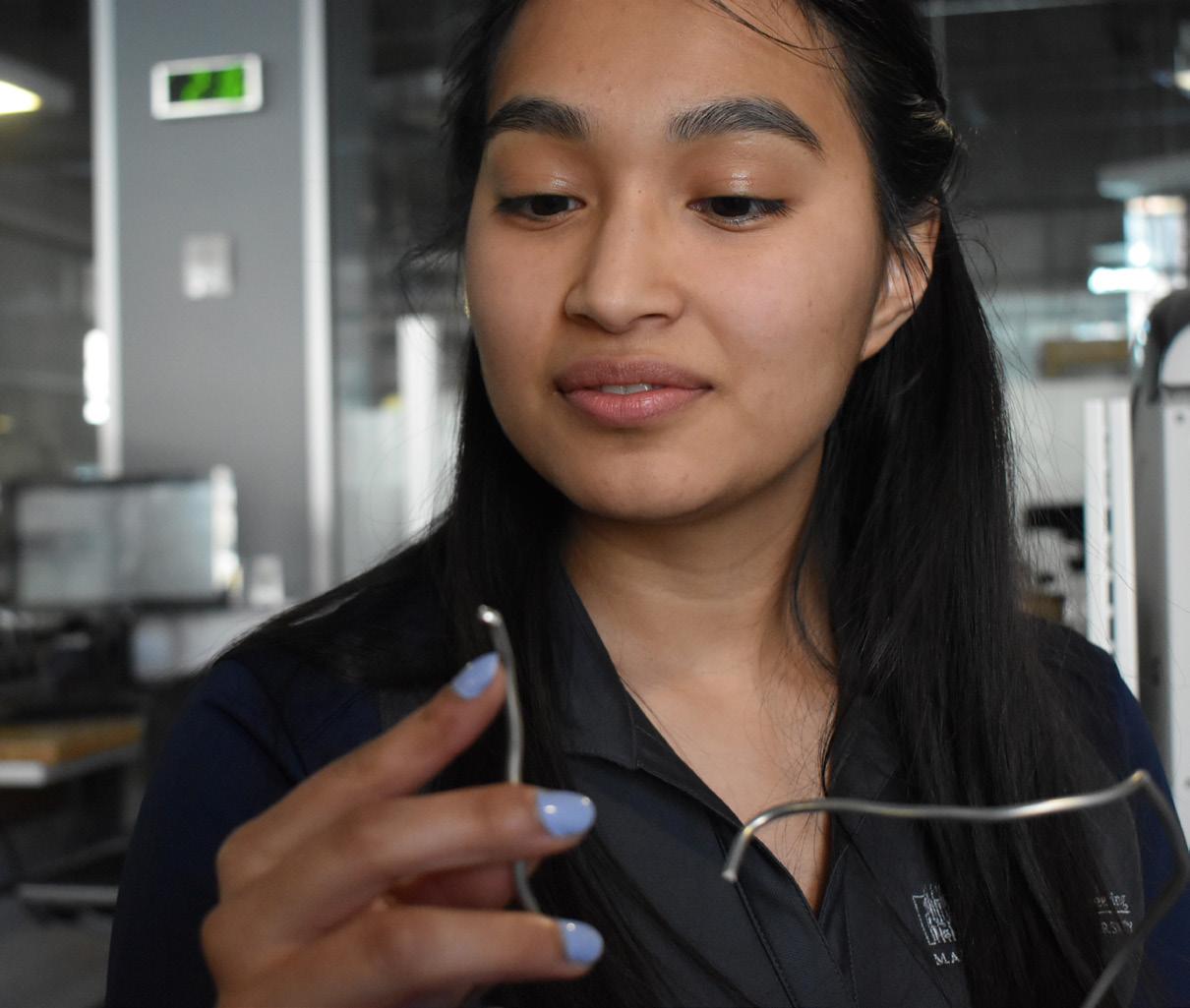
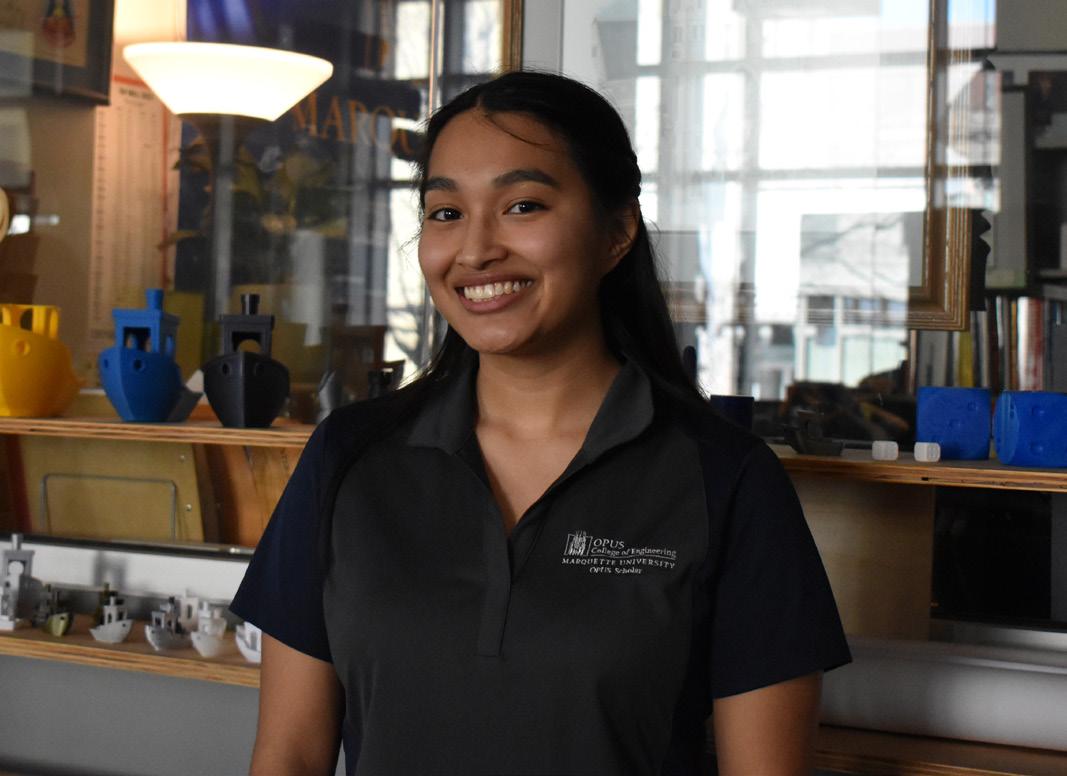
Biological sciences is a career field that is roughly 67.7% white, but like many students of color, her passion is greater than the numbers.
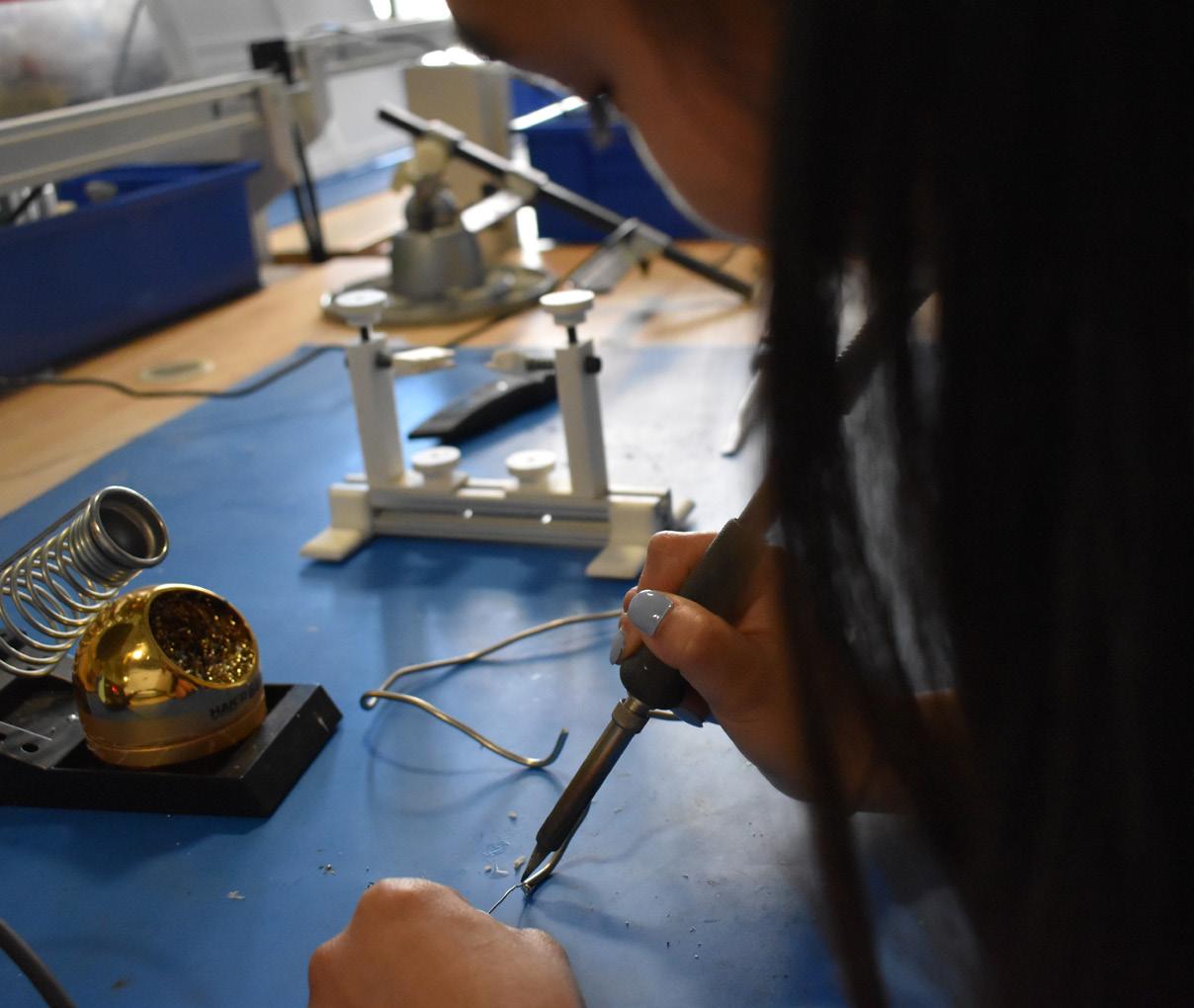
“What encouraged me to keep going was the desire to be that representation,” Zaki says. “I think that’s really important in the healthcare field … being able to graduate and be a pharmacist, I would be a representation to any girl that wants to go into pharmacy. If I saw a brown, woman pharmacist, I would be more encouraged to pursue that.”
Although she will have to wait till 2025 to cross the stage, Zaki says she can already picture the moment clearly.
“The visual I have of seeing my parents in the crowd and seeing one of their daughters graduate, I think that’s the one thing I am working towards and the one thing that pushes me to keep going in higher education,” Zaki says. “I know they went through a lot coming to America and made a lot of sacrifices, not only financially but culturally too. Graduation is going to be an important day for me.”
For Basurto-Gutierrez, her fast-approaching “important day” makes her reflect on what her graduate self would say to her now.
“She would tell me you finally did it, but there’s more to do,” Basurto-Gutierrez says. “Don’t stop learning just because you crossed the stage. (Education) opens doors that you did not know were possible. Push yourself to be better not only for yourself, but for those around you and for future generations.”
spring 2023 19 News
photos KATIE CRAIG
AREas oF StuDY AREas oF StuDY AREas oF StuDY UnDERrepREsEnTEd
SOPHIA TIEDGE TRINITY ZAPOTOCKY
John Su, vice provost for academic affairs, says the humanities are essential to helping students understand the world, but some professors think while the humanities are essential, there’s more Marquette can do to support them.

“The humanities are an essential part of a Jesuit education,” Su says, “They engage students in the enduring questions of our daily lives.”
Dawne Moon, a professor in gender and sexualities studies at Marquette, says that the departments in humanities are losing faculty. When she started working in social and cultural sciences, there were six tenured faculty just for sociology, but now there are two.
Moon says her area of study is lacking the resources they need to reach their full potential. She says Marquette doesn’t have an office or staff member specifically for gender and sexualities studies for students to come and ask questions about the majors and minors they offer.
“On the second floor of Lalumiere, there was an of-
fice, but it’s empty now. That used to be where you could just go and ask questions about gender and sexuality studies, and the center is on hiatus. It would be great if that suite could be the Center for Interdisciplinary Studies if it’s still available,” Moon says.
The current Center for Interdisciplinary Studies for the College of Arts & Sciences is located in Sensenbrenner Hall, 103.
Samantha Majhor, an assistant professor in English with a focus in Native American literature, expressed similar thoughts regarding the amount of available support.
“The English department, as with other departments in Arts & Sciences, has needed more support, more faculty hiring and ways to support the faculty that are here … For me, the biggest one is recommitting to race, ethnicity and indigeneity studies,” Majhor says.
Majhor works in the Center of Race, Ethnicity and Indigeneity Studies. When she was hired, she was told that the university was expanding this center, but she has seen
20 spring 2023 News
words
photos FORSTER GOODRICH
challenges in that expansion actually taking place.
“I feel like we are not giving students the opportunities that one finds through those avenues of studies because we are not hiring faculty in that area,” Majhor says. “We’ve celebrated the fact that this latest class of students is the most diverse we’ve ever had. But, we really need to also shore up visibility of faculty of color within the faculty to meet the needs of all of our students.”
Cedric Burrows, associate professor in the department of English, also says he feels like there’s a deficit in resources for his department.
Burrows studies Black rhetoric, and he says along with reducing class sizes, Marquette should have a center that focuses on social justice alongside more funding.
When Burrows started at Marquette, his class sizes averaged around 15 students, but now his classes are reaching 30 students.
“I think smaller class sizes would help, especially since a lot of us are teaching writing. It’s harder to do with 30 students than, let’s say, 15. So when I first started here, a lot of upper-division writing classes were 15. So, you know, you can get to know students more. You can do a lot of activities in class, and you can really give them more in-depth feedback on their papers,” Burrows says.
Data gathered in 2020 found that Marquette’s student-to-faculty ratio is 13:1. The average upper-division classes were 25 students while the
lower-division class average was 33.
“Cultivating empathy is really important in this world, and the President [Lovell] knows this and is very invested in that, and the humanities helps us to do that,” Moon says.
Burrows says if you are going to study business or nursing, the humanities curriculum would teach students how to communicate and achieve social justice.

“Let’s say you are thinking about buying a business in a low-income neighborhood: how it would affect the people around the area, or if you’re treating a patient to ask them about their stories, their backgrounds, so they could get a better quality of care,” Burrows says.
Burrows says the humanities are so essential because they teach students how to communicate across cultures and respect different cultural values that people bring into the workplace.
“In many ways our education
tends to fail us on these topics, and that creates the destructiveness we see in our discourse. If we educate ourselves on these topics, histories (and) intersections we’ll be better off as a society,” Majhor says.
Majhor says that in a time where topics of social justice and race are so prominent, it makes sense for Marquette to offer classes and support these studies.
While Marquette offers these courses for students, Majhor says that most students are typically viewed as consumers who will pay the student loans and the expense of attending university.
“That tends to be shortsighted thinking,” Majhor says. “Like I said, these are skills that students actually need in the real world. Students are saying I love English, I love what I’m learning here, but what am I going to do with it?”
Majhor says facts and studies have shown that students with humanities backgrounds actually excel in the workplace.
“The humanities remind everyone about respecting people, respecting their histories, respecting their narratives,” Burrows says.

Moon says that it’s important for students to be questioning things that previous generations didn’t, and by doing this, it can improve their workplace, no matter what field.
“Liberal arts training is the heart of the Jesuit mission, and if we lose that, I worry about the future of the university. I worry about the future meaning of a Marquette degree,” Moon says.
spring 2023 21 News
MIDNIGHT RUN
MIDNIGHT RUN
words ERIN HOWARD
While visiting food pantries, homeless shelters and other service sites across Milwaukee, one might run into groups of young adults dressed in Marquette University apparel. Although the name of their group is “Midnight Run,” this organization actually has nothing to do with running.
Founded in 1988, Midnight Run is an organization that provides Marquette students the opportunity to get involved with the Milwaukee community, by offering them the option to volunteer at various sites around the city.
Midnight Run is supervised by Marquette’s Campus Ministry and is operated by a team of student coordinators.
At the start of this spring semester, Midnight Run offers all interested students the opportunity to select which service site they would prefer to assist at on a weekly basis during the semester.
For Lily Eggerding, a senior in the College of Arts & Sciences and co-coordinator of Midnight Run, she says the organization is a valuable way for students to experience life outside of the university’s campus.
“I don’t have a car and Marquette is kind of in its own bubble, as in students don’t always get to see what’s outside of campus,” Eggerding says. “I joined Midnight Run because I wanted to be able to learn more about the Milwaukee area and get the chance to actually go out and meet people from the community.”
This spring, Eggerding says she is looking forward to spending time at a local church with her team and packaging meals for those in need.
Wanting to engage with Milwaukee’s younger population, Mary Prystalski, a senior in the College of Health Sciences and co-coordinator of Midnight Run, says that she is enjoying the opportunity to volunteer at the Cathedral Center each week.
“This semester, I’ve been working at the Cathedral Center, which is an emergency center for families,” Prystalski says. “Once a week, we open a playroom for all the kids to come in, and it’s just a really positive experience both for the kids and for all of us Marquette students to watch them play together.”
For Prystalski, she says participating in community service means challenging oneself to think deeper about how to make a real difference.
“Volunteering at these sites will really get you thinking about complex issues within your community, like where problems such as food insecurity and homelessness come from,” Prystalski says. “Once you understand where the problem comes from, then you start thinking about how it can be solved long-term and what you personally can do to help.”
For those worried about stepping out of their comfort zone and entering service sites, Prystalski says that they count on Midnight Run to ensure that all participants feel supported while they are volunteering.
“You’ll always be with a group
photos KATIE CRAIG
full of other people when you’re at the site, so it really feels like a safe environment,” Prystalski says. “There’s always leaders there to rely on and ask questions to, if you’re nervous.”
Colleen McCabe, a senior in the College of Education and a co-coordinator of Midnight Run, says that Midnight Run encourages students to consider some of the university’s core Jesuit values, such as “cura personalis” when interacting with people during their service experience.
“Service teaches people to see the good in others, kind of like how Marquette teaches the idea of cura personalis, service teaches us to accept the whole person,” McCabe says. “Not everyone is going to be like you, but it’s important to accept people as they are and make them feel welcome and included as a whole human being.”
Grateful for the opportunity to return to more in-person service activities since the COVID-19 pandemic, Eggerding says that there is no experience quite like putting one’s words into action and helping out the dear neighbor.
“I honestly think Midnight Run is the most meaningful thing I’ve done in college,” Eggerding said. “You learn so much in your classes at Marquette about why you should serve other people, and Midnight Run gives you the chance to step outside and finally use that knowledge and energy.”
22 spring 2023
News
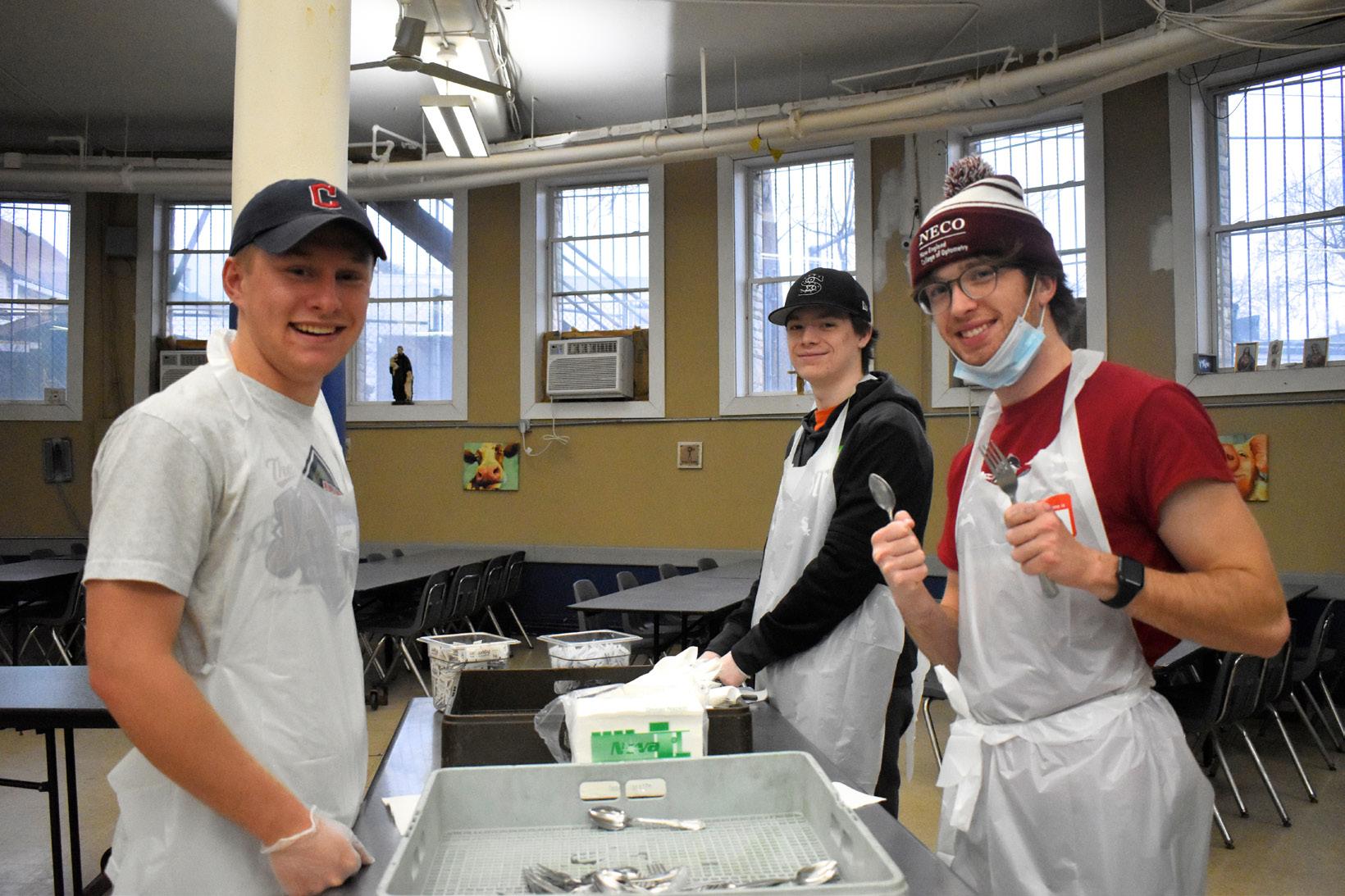


News spring 2023 23
Through the good times and the bad times, the second-shift custodial staff here at Marquette are always there for each other. Whether it be a personal issue or an illness, three custodial members view their coworkers like family members.
“If anybody’s having real problems, we try to help each other,” Marquette custodian Sam Shrank says.
Shrank has been working with Marquette custodial services for 16 years. Shrank had a cancer scare this past

summer, requiring a surgery that kept him away from work. He held back tears describing the outpour of support he received from those among the 22 members of the second-shift custodial staff who work 3 p.m. to 10:30 p.m. on weekdays.
“I have the best coworkers you could ever have. It made me want to cry. I couldn’t believe it,” Shrank says. “They got me through it with no problem. They called me up and asked me how I was doing. It’s like a family. That’s why it’s nice coming to work every day.”
words
KEVIN FITZPATRICK photos KEIFER RUSSELL
Michelle Blasier, a custodian at Marquette since 2010, says it was easy and important to support Shrank, upholding the belief of family within the workplace.
“We were like, ‘We miss you, when are you coming back?’ and he said it made him wanna cry because we missed him,” Blasier says. “You’re never alone, there’s
24 spring 2023
News
always gonna be someone there to help.”
30-year custodial staff member Margarita Hernandez advocates for this mentality of supporting coworkers not only when they need it most, but in everyday life.
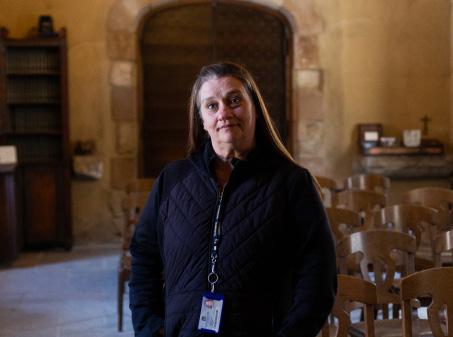
“I always try to show love because I know what it’s like not to get it. So for me, I try to have that connection with people,” Hernandez says. “I do try to show my love to let people know I’m here if you need me, and I think that’s what it should be in every department because everybody needs somebody. That’s going to make a family.”
Second-shift supervisor Chuck Willer, a title he’s held since 2007, says he couldn’t do his job without the relationships he’s been able to make with his fellow second shifters, detailing his philosophy for a successful work environment.
“I try to do this like a family atmosphere. We all work together, we all cover each other’s backs, the way it should be,” Willer says. “We’re trying to have a fun atmosphere because if you can’t work and have a little fun, it ain’t worth it.”
Aside from forming meaningful relationships with fellow custodians, the trio mentions the importance of formulating connections with students. Along with this sense of community, all three say they enjoy receiving acknowledgment for their hard work.
“I think the most important thing for me is when
I do my job and the staff and the students acknowledge your work and they appreciate what you’re doing every day. That makes me happy and makes me want to come to work and do my job because I feel like they appreciate what I’m doing,” Hernandez says. “Out of the 30 years that I’ve been here, you see a lot. You see a lot of people come and go, you see a lot of buildings tear down and come up, and it’s good to see that.”
Hernandez shared a meaningful experience she had with an international alum who came back to campus with her family to show them around. The alum called Hernandez by name before sharing a hug and a career update that Saturday morning.
Shrank made mention of a discontinued program that involved students working with the custodial staff. Unsure of whether it’s a budget issue or a decline in student interest, Shrank says the staff would love to be able to make these types of workplace connections with the student body, as well as avoid having to lift heavy wax buckets.
“I had about 10 students and nobody knew how to do any kind of floor work and stuff like that. I had to try to get everybody in line. But when I first came here, we all had blue shirts, right? And they would call me Papa Smurf and I had little Smurfettes,” Shrank says. “But now we have no students here.”
spring 2023 25
News

News
photo ALEX DEBUHR
words HANNAH HERNANDEZ CLARA LEBRON
26 spring 2023
illustration ERIN SCHNEIDER
For some students, college campuses have begun to transform from a place of learning and growing to an arena full of dangerous and risky situations.
Marquette University faces an additional challenge, however, as the campus is located within one of the largest cities inside the Midwest. Although students could be exposed to crime anywhere in the city, only the campus is within Marquette University Police Department’s jurisdiction.
Alyssa Hartman, a first-year in the College of Health Sciences, learned this through losing her belongings on a bus outside of campus.
“It was quite late at night and I was out with some friends and my lanyard that had my IDs and unfortunately my dorm keys on it did get stolen,” Hartman says.
Although this happened to Hartman, she says that when she is on campus, she feels extremely safe.
“I worked directly with MUPD to help me with the Milwaukee Police
Department police report that I had to file. MUPD has been extremely helpful and they’re always willing to sit down and help you through a police report or come and get you if you don’t feel safe,” Hartman says.
Marquette’s Police Department has been a part of the university since 2015 with the campus previously being protected exclusively by security guards. However, the department has continued to grow since its implementation.
The President’s Task Force on Community Safety was created in 2020 to address safety and security on campus and in the community through lasting solutions for safety measures, communication, resources and partnerships.
There are 12 proposals from the task force. Some of those completed includes reimagining campus transportation, establishing a Behavioral Health Unit within the Marquette University Police Department and expanding safety alert text availability to parents.
One of the most recent and widespread initiatives the task force has implemented has been the creation of the new rideshare service EagleExpress. Although the application has faced criticism from students, Marquette is still collaborating with the developers in order to ensure more efficient rides for students.
“I think that the EagleExpresses are a great option if you’re on campus because they’re there for you at the times that it’s needed most when
it’s dark outside,” Hartman says.
Comparing data for the six months prior to implementation of the task force with data six months after shows a 46% decrease in robberies and a 26% decrease in motor vehicle thefts.
Aleksandra Snowden, director of undergraduate studies and associate professor in the department of social and cultural sciences, researches crime patterns across Milwaukee neighborhoods.
Snowden examines how alcohol-selling establishments and other places that operate in neighborhoods can contribute to neighborhood crime rates.
“Primarily, I focus on alcohol-selling establishments because of the important role that alcohol has in crime, and reducing alcohol availability via carefully designed and implemented policy mechanisms may reduce crime in neighborhoods,” Snowden says.
From her research, Snowden says violent crime in 2022 is 15% lower than it was in 2015, and property crime is 28% lower than it was in 2015. Specifically, Snowden says there has been a decrease in crime in the near west side, where Marquette is located.
The Near West Side Partners is a nonprofit organization funded through the support of Advocate Aurora Health, Harley-Davidson, Marquette University, Molson Coors and Potawatomi Business Development Corporation.
In 2015, NWSP launched the Promoting Assets, Reducing Crime initiative. This initiative aims to address the needs of the community in four areas: safety, housing, commercial corridor development and neighborhood identity and branding.
Through efforts of the PARC team, Near West Side Community Prosecution Unit, City of Milwaukee and local residents and businesses, the 27th Street Tobacco Shop was declared a public nuisance and voluntarily closed.
“Decrease in violent and prop-
News
spring 2023 27
erty crime in the Near West Side is much greater than the decline in crime for the rest of the city. As such, the neighborhood in which the university exists has lower crime relative to the city of Milwaukee,” Snowden says.
For some students, like Alanna Rupert, a junior in the College of Health Sciences, these changes have been palpable. As a desk receptionist, Rupert says she doesn’t feel like she is in any additional danger because nothing criminal tends to happen at the front desk.
“I feel like crime on campus has gone down recently. Last semester, I used to get a notification a day from MUPD. Now, it’s more like once a week,” Rupert says. “Being at Marquette, I don’t think there is anything that can really be done to totally eliminate crime on campus or reduce it to that point. The university is inside a big city, and you can’t really fault the city for having crime.”
Despite the decrease in crime, Hartman says students should continue to make safety a priority because there are always safety issues.
“Even if you think that you are being as safe as possible, you have to be extra aware because people that are the top of their field, smartest in their class, are still going to have problems with safety,” Hartman says. “It doesn’t matter, so it’s important to make sure that you are taking extra precautions and going in groups of people as much as possible.”
News
28 spring 2023
SUsTainABILiTy EFfoRTs
words
BRIANA NELSON
Walking through the center of Marquette University on Wisconsin Avenue, buildings flank each side of the street. Cars rush by down the road, and construction can be found without walking far in any direction. All of these factors contribute to the first impression of Marquette’s sustainability efforts and are just a few of the elements considered when determining Marquette’s level of sustainability.
Marquette University testifies to its environmental efforts by joining organizations and signing pledges dedicated to sustainability. In 2015, Marquette University President Michael Lovell signed the St. Francis/Laudato Si Pledge, a promise geared toward encouraging higher institutions to bridge the gap between religion and
the environment.
Although President Lovell signed this pledge eight years ago, it was only this year when a task force was implemented to lead efforts to meet the goals set by this pledge, and some students have been left wondering what Marquette has done since then to improve upon sustainability efforts.
Marquette is a member of the Association for the Advancement of Sustainability in Higher Education, an organization that encourages higher institutions to pave the way to a greener campus.

Julian Dautremont, a representative for AASHE, says that the organization uses a tool called STARS to help universities self-report sustainability efforts.
“STARS is a self-assessment tool that universities use to measure and report on their sustainability performance. We look at everything from teaching and research to campus operations. We also look at waste, transportation and engagement of students … affordability and diversity and inclusion issues,” Dautremont says.
Upon completion of the self-assessment submitted in 2021 by Sustainability and Energy Management Coordinator Chelsea Malacara, Marquette was granted a score of 36.76 out of a possible 100 points. This earned the university a bronze star rating, the lowest on the scale. This is a decrease from the 2016 report, where Marquette received 51.6 points and a silver star.
“STARS is flexible, and there are areas where Marquette didn’t provide any information. For example, there is an indicator around how people get to and from campus,” Dautremont says. “It was marked as ‘not pursu-
spring 2023 29
Investigative
photo KATIE CRAIG illustration ERIN SCHNEIDER
ing’. So, the university didn’t get any points for that or other parts that weren’t filled.”
In response to this rating, Malacara says that it will be used as a benchmarking tool for improvement.
“When we completed the report, we were able to assess where the gaps were, what projects could be taken on in the short term and what initia-
tives would be long-term endeavors,” Malacara says.
“Our peer-education team of sustainability interns has done a phenomenal job educating students and encouraging the adoption of more sustainable practices … Marquette also offers sustainability-focused courses in over 15 departments on campus each year. Our faculty are

certainly leaders in this area, too, designing interdisciplinary courses that teach practical skills.”
Another member of the task force group is Father James Voiss, vice president of mission and ministry. Voiss says that sustainability is crucial to the mission of the Society of Jesus and Marquette values as a whole.
“Fidelity to our mission requires that we engage the challenges to sustainability and find effective responses to them individually, as a campus, as people of faith and as members of our common human family,” Voiss says.
Although the STARS rating leaves room for improvement, according to Malacara. Marquette has met and exceeded several previously set goals.
“The 2018 campus sustainability plan aimed to reduce carbon dioxide equivalent emissions from heating, cooling and power by 25% from our baseline by 2025. We have effectively surpassed that goal and will be setting new reduction targets this year which will be published in the new strategic plan,” Malacara says.
Allie Plante, a sophomore in the College of Engineering, says that the
30 spring 2023 Investigative
focus on innovation and awareness in Marquette’s sustainability agenda is, to her, an important part of sustainability efforts. Plante is focusing on environmental engineering and environmental studies, a path she chose after taking environmental classes in high school.
“New implications of technology are very apparent on campus, and it shows that the school cares a lot. But, they’re also tying that into the spreading of awareness to students to the importance of the innovation which I think is just as effective,” Plante says.
She says that Marquette should post about its sustainability goals on social media, creating a way to both educate students and be held accountable.
Plante also says Marquette’s urban geography makes it difficult
for the school to incorporate sustainability, but she believes Marquette is doing a good job with the available resources. However, all of the University of Wisconsin schools that participated in the AASHE report received STARS ratings of silver or higher. Even so, Marquette does rank higher
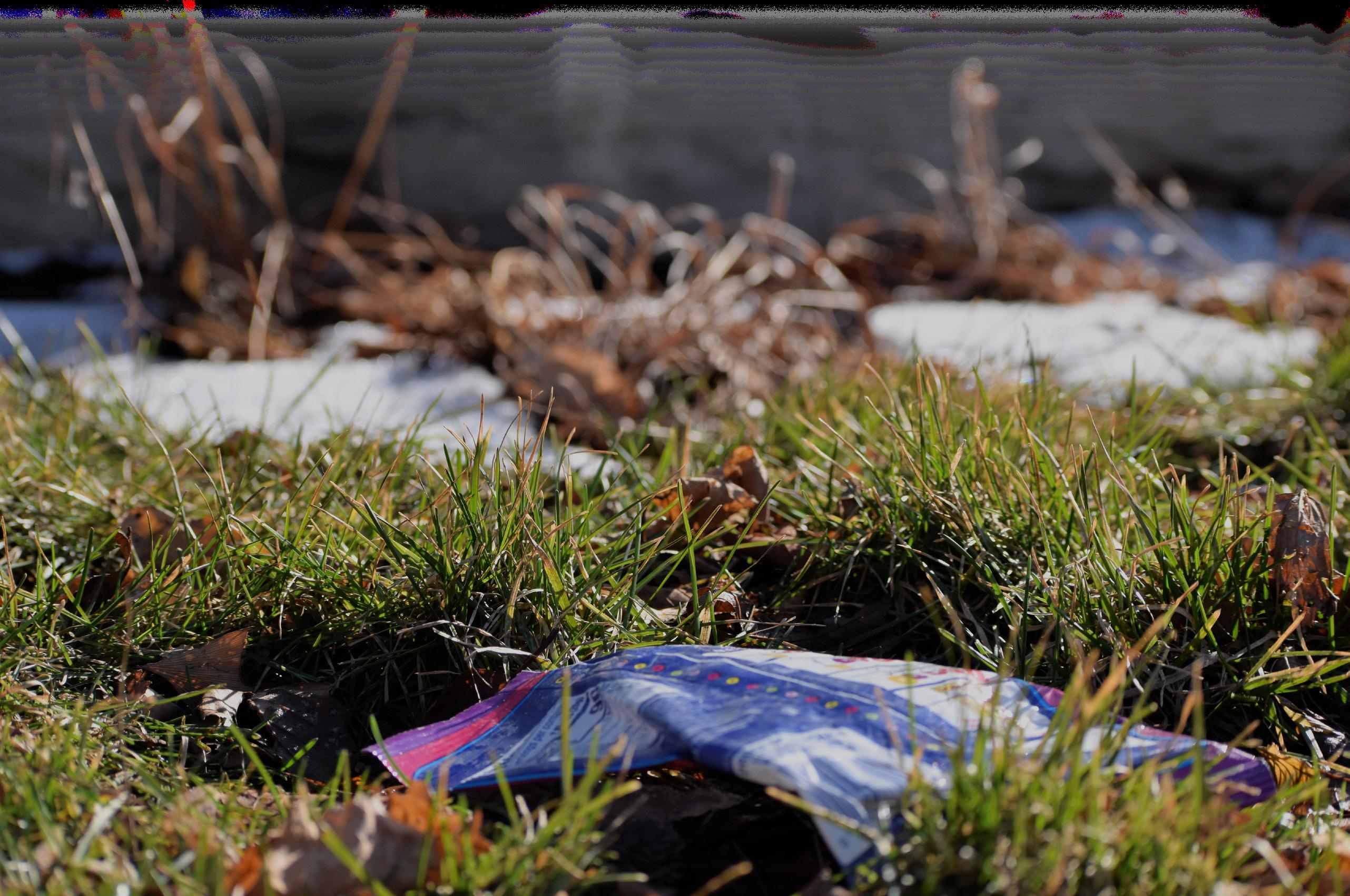
sessions or provide feedback when the opportunity arises. Second, act with intention in your personal life, academically or inside your social circles,” Malacara says. “When we are intentional about what we consume, how and where we spend our time, we can make choices that are better for us and for the environment.”
Malacara says she also encourages students to speak up and share their ideas.
in certain parts such as Food & Dining and Diversity & Affordability.
Engagement is an important piece of sustainability, Malacara says, and she encourages students to keep up with the latest information.
“Attend student engagement
“Leverage your own talents to make change. If there is something you want to see on campus or in our community, find out who to talk to and be part of that change,” she says. “Some of the best sustainability initiatives and ideas on college campuses across the world were first started by students.”
Investigative
Fidelity to our mission requires that we engage the challenges to sustainability ...”
spring 2023 31
FATHER JAMES VOISS
words
Bright orange cones and chainlink fencing litter campus as buildings are being remodeled, torn down or constructed.
Marquette has a few ongoing construction projects, including revamping Straz Hall into the new College of Nursing building, renovating the Helfaer Recreational Center and the recently finished O’Brien Hall for business.
Lora Strigens, vice president for planning facilities management and university architect, says the master plan for construction on campus opened up an opportunity for flexi-
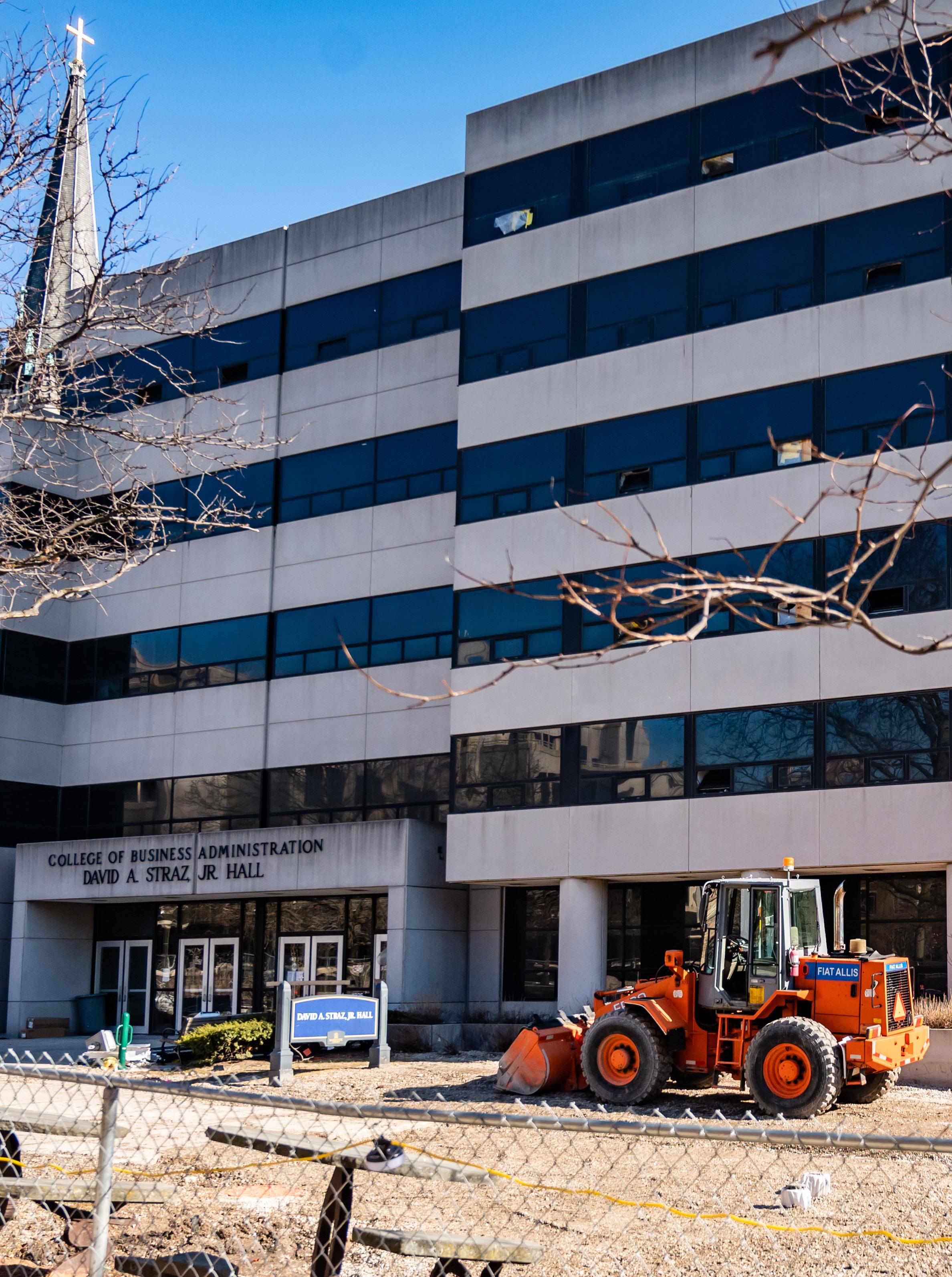
32 spring 2023 Investigative
JOLAN KRUSE IZZY FONFARA DREWEL
photos ALEX DEBUHR
bility and growth.
“Every square foot has value, so we want to be sure we’re using that efficiently and effectively,” Strigens says. “We’re thinking about what the impact for our student population on campus is, student experience is first and foremost on our minds.”
Marquette University President Michael Lovell says the home of the College of Nursing, Emory Clark Hall, is being moved to a new building for one main reason.
“The expansion of nursing school can’t educate all of the nurses that come to Marquette in the way they want to at the current facility so we’re updating it to (the model of) O’Brien Hall,” Lovell says. “We want to transform the spaces when they (students) aren’t in the classroom and the way they interact with each other. We want to transform the classroom to really give them a firstclass education.”
Kyla Schwager, a sophomore in the College of Nursing, says she appreciates the improvements and advancements that will be included in the new nursing building.
“I’m most excited to see the expansion of graduate programs and having more space,” Schwager says. “Emory Clark is really small. I noticed our classes are getting crowded. Some classes there are 150 people and others there are 15 to 20. I don’t know how they’d manage that in Emory Clark.”
The use of the current nursing building, Emory Clark Hall, is yet to be determined.
The Rec Center is also being updated, leaving many students to attend the Straz gym or O’Donnell
Hall instead. Gabrielle Prehn, a firstyear in the graduate school, previously worked at the Rec Center and is now floating through the several temporary workout locations.
“I think Marquette put us in a pretty bad position by closing the Rec Center and we are doing the best we can for the next two years,” Prehn said. “The [Rec] Plex is always super busy and working there can be stressful, but the other locations are chill. Overall, it just changed the dynamic when you stop using one of the main buildings.”
Lovell says the Rec Center has needed to be updated for a long time, which is a project he says students deserve and have been asking for. The new 180,000 square foot building will include a 25-yard swimming pool, a counseling center, a spin studio, four tennis courts and more.
While administration plans for the construction to usher in a new age for Marquette, there are still questions regarding the accessibility of these new buildings.
With new buildings in mind, Strigens says it’s important to be aware of accessibility, even though every building meets the code at the time it was built.
“With the new buildings, we can think through on the front end to make sure accessibility issues are addressed, there are gender inclusive restrooms and wellness spaces. It’s harder to do that with old buildings,” Strigens says.
Marquette’s campus is home to many old buildings, several of which may be difficult for disabled or injured students to access. These buildings require people to climb
stairs to reach the elevator, and have inaccessible bathrooms among other issues. These older buildings, sometimes referred to as the “Historic Core,” include Johnston Hall, Marquette Hall and Sensenbrenner Hall. They were built in the early 1900s.
“The more interesting challenge was likely on renovating the Historic Core, you take three buildings that are all a 100 years old and have to bring them up to the current codes and standards,” Mark Federle, associate dean for the College of Engineering, says. “Sorting through all those challenges would’ve more interesting than when you’re just starting with a brand-new building.”
To address these accessibility issues, Marquette’s Planning and Facilities Management collaborates with several departments within the university.

“There are a lot of campus partners that are part of that; Office of Disability Services, Diversity and Inclusive Excellence, there’s a lot of voices that are important part of that project,” Strigens says. “I’d say there’s still a lot more we can do on campus to make sure that everybody feels welcome and comfortable in space, but we continue to look at those opportunities.”
The older buildings on campus comply with accessibility codes for the time they were constructed, but newer facilities are all required to be compliant with the Americans with Disabilities Act. However, it is worth noting that the ADA hasn’t been reformed or reviewed since the 1990s.
Federle says another challenge is creating an argument compelling enough to get contributors to want
spring 2023 33
Investigative
to help fundraise campus construction projects.


“One of the challenges that Marquette has is these big ideas that we have for changing requires a great deal of fundraising,” Federle says. “Both O’Brien Hall and Engineering Hall were completely funded external to any student tuition dollars.”
Additionally, the Wellness and Recreation Center is actively fundraising and campaigning for donations from the campus community. The university states that once $10 million is raised, there is an anonymous couple who will donate another $5 million.
Despite challenges, Lovell says he wants to leave an impact on campus that will be remembered.
“The legacy I want to leave is I want Marquette to keep innovating and keep changing and be looked at as a university that is on the cutting edge,” Lovell says. “It’s one thing to have a diverse campus and it’s another to make everyone feel welcomed and supported.”
34 spring 2023
Investigative
StuDEntaCtiviSM for
the ‘whole person’

Investigative
words SKYLER CHUN
photos ISABEL BONEBRAKE
Over the past century — largely following the wake of the Civil Rights movement in the 1950s — Marquette students, faculty and staff have been consistent advocates for change. But, much of their fights for change are still ongoing today.

preparing to march down Wells Street in protest of ongoing issues of racial violence in front of the Milwaukee courthouse.
In March 1964, around 700 Marquette students and faculty members gathered in front of Schroeder Hall,
The demonstration was led by Marquette organizations, Students United for Racial Equality and Young Christian Students, standing in solidarity against recent violence in Selma, Alabama, and the fight for equal voting rights across the country.
“The news that there was going to be a protest march spread around the campus like a prairie fire,” a Marquette Hilltop article says. “They
“neutral position” of the administration towards holding the event at the club, according to the Milwaukee Journal Sentinel’s coverage at the time.
1968
The SURE organization held another march to O’Hara Hall on 11th Street in 1968, demanding more scholarships for Black students, more classes on Black culture and a greater amount of local community outreach programs. Some members also fasted, eating only bread, and drinking tea and water.
After the assassination of Dr. Martin Luther King Jr. April 4, demonstrations on campus led to an incident at the Brooks Memorial Union May 8, where 200 students barricaded the doors of the union, trapping over 400 faculty and staff from leaving the Pere Marquette dinner being held inside. Two students were arrested.
Later that night, 100 demonstrators gathered in the union and refused to leave until the arrested students were released.
The Rev. James Groppi, adviser of the Milwaukee National Association for the Advancement of Colored People Youth Council, spoke to a crowd in the union ballroom, speaking up about institutional racism.
“We have stayed in our institutions and have kept quiet, and in doing this we have aggravated the problem,” Groppi says in the May 8, 1968 issue of the Marquette Tribune. “We want more and we are going to get more.”
TODAY ConvocationDemonstration
However, students today are still fighting for more.
Marquette University’s New Student Convocation was canceled and later postponed Aug. 25, 2022, after a demonstration held by members of
Investigative
“They were tired of words”
“Whites-only” policy
the Black Student Union, Marquette University Student Government, National Association for the Advancement of Colored People at Marquette University and the Latin American Student Organization.
Outside Lalumiere Language Hall, just 15 minutes before the program began, students held signs and chanted phrases in an effort to hold the university accountable for how students of color are treated on campus.
The 10 students were put on probation and sent through the code of conduct process through which they were later forced to step down from their leadership positions.
“In my read, university lead ers are punishing the students for making them feel personally embar rassed and thrown off at convocation. It’s not just unfair, it’s immature. Our leadership should be better at handling these situations,” B. Pladek, associate professor of English, says in an email.
The students were also asked to pay a $300 fine, but that requirement was later taken back by the univer sity.
“It’s worth stressing that while the students’ protest disrupted the convocation, it was university admin istrators who canceled it,” Pladek says in an email. “The students never had that power.”
Mental Health for Student Athletes
But activism throughout Mar quette history has not just come from the general student body, small er groups on campus are making a difference in their own ways. Siani Brown-Carr, a junior in the College of Arts & Sciences, is a member of the women’s track & field team and a mental health advocate for stu dent-athletes across the nation. After playing sports for over a decade, Brown-Carr says she began to notice the pressure that athletes faced growing up.
“It’s a lot of pressure. It’s a lot of work. It’s a lot of sacrifice. It’s a lot
of running around or doing things all the time. Busy schedules, and it’s this pressure to uphold what a student-athlete is supposed to look like,” Brown-Carr says. “And now when you’re a Division I athlete, you’re often expected to hold a certain image on campus.”
She says she also noticed how much her success was determined by time.
“For us, it’s how fast we run, but it might be how many points you score,” Brown-Carr says. “I started realizing how my performances were affecting me personally. I found that really minimal people spoke up about being a student athlete … and I grew to find a love in just the idea
and compassion.
“What we learned is that a lot of the kids are already experiencing what college athletes are experiencing. They already (are) experiencing performance anxiety and pressure,” Brown-Carr says. “The project was essentially a chance for them just to be able to have a safe space and to learn, but also feel comfortable with sharing and not feeling like they are alone.”
She says she hopes to normalize that it’s okay to not be on your best game every day.
Despite various challenges and inequalities over the past century, the Marquette community has and continues to be resilient on issues

Investigative
usic can convey different meanings to each individual, sending messages that are beyond measure. As the chords, notes and lyrics float through the air, they can fill your body with countless emotions, pulling at your heartstrings like a guitar.
Many groups can create these sensations for individuals, such as the Marquette Gospel Choir, which welcomes students of all faiths to

Noise
Mexplore and enhance their spirituality through gospel music.
Gospel music is a genre of Christian music developed from songs that helped sustain generations of African people through slavery. These songs inspired hope and were then introduced to other cultures.
Debra Duff, the current Marquette Gospel Choir director, oversaw the Mount Mary Gospel Choir for 19 years before coming to Marquette in spring 2021.

“I grew up around music and
played for the church choir when I was younger, and so I continued to utilize my musical gift,” Duff says.
Duff gets her inspiration from the history of gospel music and from the different artists she listens to. She says her decisions revolve around encouraging messages.
“At this time it connects to me because it’s uplifting, and I just want to share my gifts with the students and have a way for them to have an outlet and come together with those who have similar interests,” Duff says.
38 spring 2023
words ISABELLA FLORES photo ALEX DEBUHR
“It’s just not for singing, it’s a ministry in itself.”
The Marquette Gospel Choir has performed to audiences at events such as singing at men’s basketball games, the Marquette’s Board of Trustees conferences and have been televised on PBS.
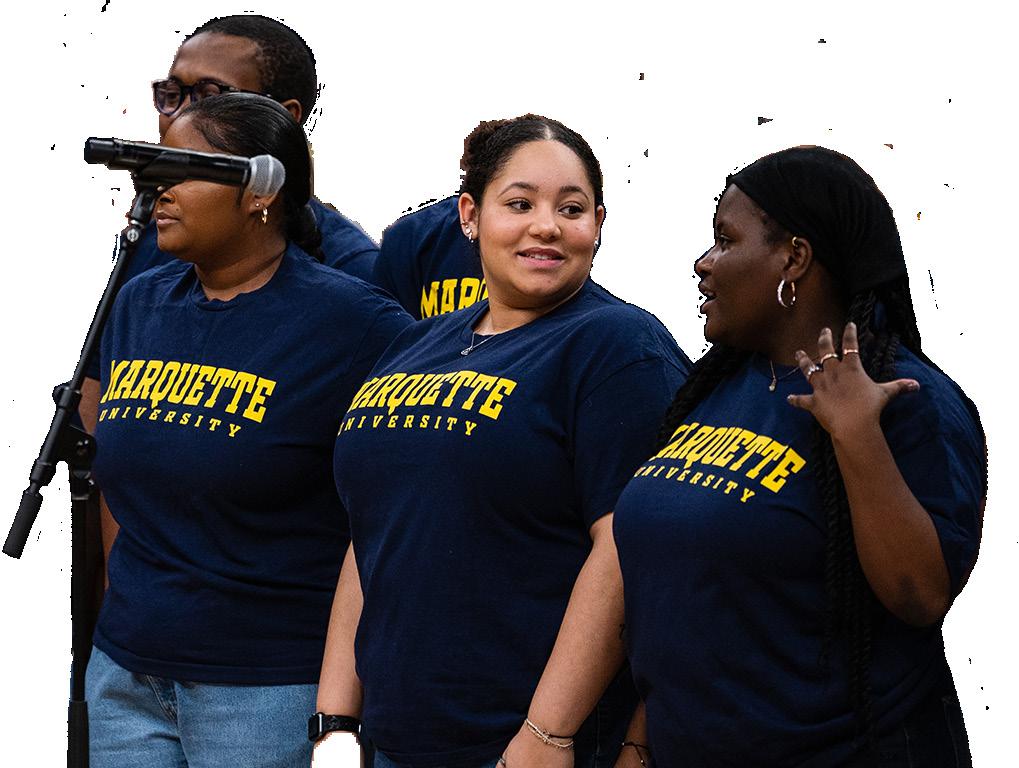
The performances excite Duff because she can see the impact of Gospel choir on the community.
“What brings me the most joy is to see people inspired by the songs that we sing, to see the students grow spiritually throughout the semester and seeing the conversations and reaction of the audience after our performances,” Duff says.
Duff feels gospel music addresses issues around the world and thinks the words they sing can positively influence society.
“I believe with everything going on in our world today, gospel music plays a major role in uplifting people,” Duff says. “There is still hope and God is in control no matter what individuals are facing, and [we want] to encourage people not to give up and keep the faith.”
Rebekah Tait, a senior in the College of Nursing, is the president of the Marquette Gospel Choir and recognizes the power of
the lyrics they sing.
“I believe the words we sing have the power to heal and create a safe and welcoming environment for everyone,” Tait says. “I have seen firsthand the power that our music has during our concerts and the special ability we have to touch lives and open hearts to the great grace God has to offer.”
Tait believes in the power of gospel music and how it can communicate people’s emotions when they may not have the words.
“Some of our slower songs can really help someone tap into the hurt and give the safe space to be vulnerable. Our upbeat songs allow a joyous environment to simply praise the great gifts we have been blessed with in our lives,” Tait says.
When the Marquette Gospel Choir is surrounded by people who appreciate them, Tait says the aura of love is indescribable.
“We also tend to have a lot of crowd engagement in our concerts that truly exemplifies the feelings of inclusion,” Tait says. “After our concerts, we always try to interact with our crowd and thank them … we have heard numerous times about the lasting impact our music and voices have
made in their hearts and lives.”
Lizzy Bitoye, a senior in the College of Arts & Sciences and the vice president of the group, believes strongly in the power of gospel music.
“I grew up in the church and was very involved in the choir while also being a worship leader. I sang in my school choir as an alto, so I knew coming here, I really wanted to be in the choir,” Bitoye says.
In Bitoye’s words, gospel music is all about remembering where you came from but also creating a welcoming space for everyone to worship God.
“The music we sing is to worship and praise God, and we invite everyone to come and join us at the events we host or are a part of,” Bitoye says.
The Marquette Gospel Choir spreads the word of God to the Marquette community and beyond. In a time of hardship and struggle, the gospel choir aims to ease this pain.
“I feel the world today is hurting and many people are still recovering from the traumatic events of the pandemic alongside everyday challenges,” Tait says. “I think our music aims to heal these broken places and give a sense of hope and security in trusting the Lord and allowing Him to take control of your life, no matter what it brings.”
Arts
t f ncin n Arts
n n
words AIYONA CALVIN
e e
40 spring 2023
L L r r
ncing f fe
g o ife Dancing th u a rough Life n


t fe
photo KATHARINE CRAIG
Bayanihan Student Organization and Saoirse Irish Dance Team are both cultural clubs on campus. They highlight their cultures by doing authentic cultural dances. They showcase their skills by performing at bars and other events at Marquette.
Krystiana Borres, a first-year in the College of Health Sciences, is a member of BSO. They produce a cultural show on campus every semester to highlight their dances.
“BSO is very welcoming,” Borres says. “For the cultural show, there is a big presence of cultural dances, and I am getting to learn more about traditional aspects of my culture from those.”
Borres illustrates one dance called Pandaggo sa Ilaw that is a popular folk dance in the rural Philippines.
“Pandaggo sa Ilaw is a beautiful candle dance,” Borres says. “I feel very grateful to celebrate and perform it here at Marquette for the first time.”
Emily Madden, a sophomore in the College of Arts & Sciences, is a member of the Saoirse Dance Team. As she danced her way through high school, she was excited to continue improving her Irish dancing skills while in college.
“We perform at bars in the Milwaukee area, and it’s a unique way to educate others on Irish dancing to people in the community,” Madden says. “Performing in bars is a great way to spread happiness and it’s really lighthearted.”
Some parents put their children in dance when they are young to give them something extracurricular to do. Learning to dance can start at all different ages and some do not learn to love it until they are older and find the beauty in dancing.
Borres started dancing ballet at three years old and continued until eighth grade. She loved ballet
because of the skillful movements and how artistic it is. Borres realized that she wanted to carry on dancing because it allowed her to escape the world and be in her own bubble.
“It’s a unique way to express yourself,” Borres says. “It’s a hobby of mine and a way to get away from the stress of school.”
Hayley Jamiola, a sophomore in the College of Engineering, is a member of the Marquette Dance Team. She performs in front of thousands of people at Marquette basketball games and other sporting events. She expresses that she enjoys the challenging choreography that pushes her dancing abilities and helps her grow.
When the pandemic hit, people all around the world were affected. Jamiola says COVID-19 affected her normal life in high school and every aspect of her performances changed, like wearing masks, social distancing and not performing in front of an audience.
Although how Jamiola performed changed significantly, joining the Marquette Dance Team allowed her to get a sense of normality back. She reveals that dance is also a way to express the emotions you are feeling, a way to escape the realities of the world.
While each of the dancers embarked on dancing as an after-school activity, now on a college campus and even on an NBA-level stage, dance has become more than just an extracurricular activity.
Madden expresses what dance means to her and how dance is what you make it, your own interpretation.
“Dance can be done anywhere, and people don’t have to have anything in common like a language, culture or an education to share the experience,” Madden says. “Additionally, dance can also be interpreted completely different by every person.”
Borres expressed how words can
be limiting, but dance is an outlet that allows you to express yourself and show your emotions through your movements.
“Seeing dance visually is a way for me to convey what I feel,” Borres says.
Jamiola explains that dance is an artistic and powerful way to express yourself, but it takes a great deal of skill and hard work to learn different techniques and styles of dance.
“No one really understands the physical aspect of dance,” Jamiola says. “In order for the dance itself to look good, we have to look like we are performing the choreography effortlessly.”
Dance is a universal language that can tell stories, express emotions and more.
“I think that dance can capture emotions that words can’t because your body is doing the talking,” Jamiola says. “Dance lets me express how I’m feeling in the form of movements, and sometimes it feels good to shut up and dance.”
Arts
Dance can be done anywhere, and people don’t have to have anything in common like a language, culture or an education to share the experience.”
spring 2023 41
EMILY MADDEN
M egaphone u r a l s
 photo FORSTER GOODRICH
photo FORSTER GOODRICH
words
PHOEBE GOEBEL
egaphone
In the United States, social movements have continued to spur change and progress since the 19th century. In order for these movements to be successful, they may require four characteristics: worthiness, unity, numbers and commitment. One of the most recent movements, Black Lives Matter, exemplifies these characteristics and was also grounded in an art form that was louder than words: murals.
Murals have a long-lasting history. From once being used as a way to improve public spaces, murals have developed into symbols of commentary on the ways in which our world works. Chris Burke, a Milwaukee artist, creates murals across the city as a means of making the community aware of police brutality.
Burke says that a lot of planning and organizing went into creating the murals for the BLM movement. A lot of consideration went into the decision of who would be featured in the murals, as the contributing artists wanted to make sure these murals were going to make a lasting impact.
The group decided on both living and dead Black Milwaukee figures, one of them being Joel Acevedo, which Burke says this mural had a deep impact on him. Acevedo died at the hands of an off-duty police officer from choking.
The mural, located on Sixth Street and Greenfield Avenue, features Acevedo surrounded by Milwaukee landmarks. The colors of the mural are bright and bold because Burke says that the goal of these murals was to humanize the victims of police brutality like Acevedo.
Burke says that the mural was actually designed by the parents of Acevedo. Through this, Burke and his fellow artists were able to capture Acevedo as his true self, through the lens of his family and friends.
Marquette is home to multiple murals that reflect the values of the university. Emilia Layden, the curator of collections and exhibitions at the Haggerty Museum of Art, says that one of the most famous pieces at the Haggerty is the Keith Haring mural, which is both pleasing to the eye and packs an important message.
In 1983, the Haggerty Museum invited New York City-based artist Keith Haring to create a mural on the fence that enclosed the museum’s construction sight. After three days of work, with collaboration with students, staff and faculty, Haring finished the piece which is now on display at the museum.
Layden says that Haring was a strong believer that everyone should have the ability to express themselves through art, as art can spread a message without outwardly saying it.
“When asked by a student why he was making the mural, Haring responded, ‘for you.’ He believed that art is
for everybody, and he wanted his work to be as accessible as possible, which is why he often worked in public space,” Layden says. “He was excited about the opportunity to paint the construction fence mural at Marquette because it was so visible from the freeway.”
Layden says that Haring used art to communicate to as wide of an audience as possible. During the mural’s production, Haring handed out pins and posters with his “radiant baby” icon on them, which was his way of spreading his message of human freedom to the Marquette community.
Professors around campus have continued to include this mural in their curriculum. From all different majors, students can interpret the mural in different ways and apply that to their studies.
“Because of the open-ended nature of Haring’s visual symbols, the mural can be approached and interpreted in myriad ways,” Layden says. “Great art — like Haring’s mural — is layered in this way, and it can impact people on multiple levels.”
Art is being utilized around campus in more ways than some people think. The Career Services Center is currently hiring five students to create art to be hung on Wisconsin Ave. Courtney Hanson, the director of the Career Services Center, says that they are looking for pieces that speak to the student’s culture and career, as interpreted by the student.
Hanson says that the idea for the project comes from encouraging more students to utilize the opportunities and space that the Career Services Center offers.
“We wanted students to see themselves in the space and know this is a place where differences are appreciated, and student contribution is valued,” Hanson says. “In this case, we may be supporting a student’s desire to build experience in creating art as a job, or we may be providing a new way for a student to reflect on their career journey through a creative lens.”
Hanson hopes that students will be able to feel a sense of belonging in the Career Center through this art project.
“We hope that we can build awareness that staff in the Career Center are interested in all students’ unique paths and welcome everyone to our space to explore the possibilities of their future and find support throughout that journey,” Hanson says.
Layden says that whether we choose to or not, we are always interacting with the art that surrounds us. Through this unconscious interaction, she says that we are constantly absorbing and interpreting the messages that art conveys.
“No matter the intended impact, though, situating art in public space transforms the way that people experience that space. It democratizes the experience of looking at art,” Layden says. “Some people might not be interested in visiting a museum or, worse, they might not feel comfortable in a museum setting. But, they may pass a mural on the side of a building every day, and whether they think about it consciously or not, they are interacting with art in those moments.”
spring 2023 43
Arts

ShowShowShowShowShowTeLLTeLLTeLLTeLLTeLLTeLL TeL AnDAnD ARTS
Show
Show ShowShowShow ShowShowShowShow ShowShowShowShowShowShowShowShowTeLLTeLLTeLLTeLLTeLLTeLLTeLLTeLLTeLLTeLLTeLLTeLLTeLLTeLLTeLLTeLLTeLLTeLL TeLLTeLLTeLLTeLLTeLLTeLLTeLLTeLL TeLLTeLLTeLLTeLLTeLLAnDAnDAnDAnD wordsLAURENPUTHOFF photos ISABELBONEBRAKE
Change is hard, I felt as though I needed something to remind me that I am loved and even if I am not at home, I will always have family and friends that will support me on my journey,” Rosie Stone, a first-year in the College of Arts & Sciences, says.
When Stone first arrived on campus, she was fearful but excited to begin a new chapter in her life. As she packed she focused on the basics, but her nerves reminded her to bring the one item that holds a special place in her heart: a small photo album of her childhood.
Flipping through the pages of her album, Stone displays a sense of joy and pure happiness as she explains a story behind each picture of her as a toddler with family and friends.
“I’ve had this photo album for as long as I can remember, so even if I don’t recall each event featured, I have heard the story behind each one,” Stone says. “My mom always told me when I first received this gift, I would bring it to daycare and show it to my class, eager to show off the loving relationships in my life.”
These items may seem small and juvenile to some, but the personal meaning held within them is larger than anything that can be brought to college.
Throughout her first year at Marquette, Stone is not only reminded of the important memories with her album but has begun making new memories with people she considers family.
Although Stone wasn’t sure what to bring with her entering her first year at Marquette, some returning students decided to bring back their necessities, in addition to items to remind them of home.
Isaac Pitner, a sophomore in the College of Business Administration, made the decision to pack more than just the basics when he arrived back on campus this fall. This time around he brought a bright red fuzzy Christmas blanket he received from his grandfather, which stays in his dorm
year round.
“As early as I can remember my grandpa and I had the tradition of watching Christmas movies every year, something so simple, but yet it was one of my favorite parts of the season,” Pinter says. “When I was five my grandpa got me this blanket and from that point on, I’ve always brought it with me to our tradition — movie marathons, with Elf being our absolute favorite.”
When school gets tough or homesickness hits Pitner, this blanket helps to remind him of his number one supporter, his grandpa. He views his item as a representation of love, and whenever he sees it he knows his grandfather is with him.
“My grandpa passed away last year and one of the things I miss most about him is how he would always given me a big, warm hug whenever we saw each other,” Pitner says. “Although I am unable to give him a physical hug now, whenever I see the blanket, I am reminded of his kind heart and positive spirit.”
As Pitner lives over five hours away, he is unable to go home as frequently as he would like, but this small token serves as a reminder to him that people do not have to physically be with him to be supporting him. Even as Pitner heads home
on breaks, he says how he always makes sure to pack this winter-themed blanket.
Pitner is not the only student to bring along a comfy item that serves as a reminder to loved ones. Caroline Gaither, a first-year in the College of Nursing, decided to bring along a pink fluffy pillow that has been with her since the age of eight.
“My love for pigs began at a young age with the help of my godfather who owned numerous pigs on his property. When I turned eight he gifted me a pig Pillow Pet, a sign of our shared love for pigs,” Gaither says.


Growing up in Illinois, Gaither was familiar with farm life, but being on a farm in California was different than anything she was used to. She considers herself an Illinois native but also views California as her home away from home.
“I haven’t been to California for quite some time as my godfather died in January of 2021, but even though I haven’t visited recently I still consider it an extension of home,” Gaither says. “This Pillow Pet is a constant reminder that he is always with me, and nothing will change that, even if he is not physically here with me.”
Although many receive an item
46 spring 2023
Arts
photo CAROLINE GAITHER
with meaning that grows over time, others are given items with instant meaning and gratitude. Whether it is a hard-earned award, an heirloom or even a physical reminder of those back at home.



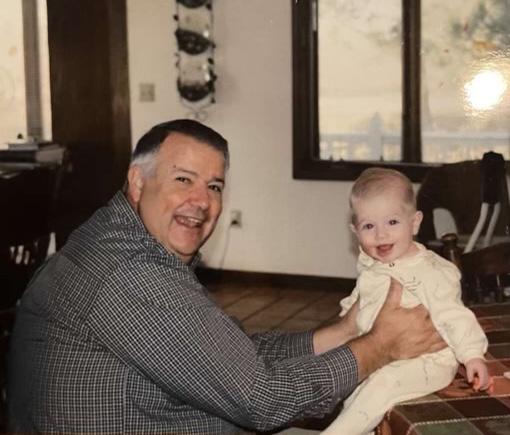
Mia Ketelhohn, a senior in the College of Engineering, dedicated her life to gymnastics through hours at the gym, endless competitions and forever bonds with her teammates. Although nothing can replicate the love she has for her teammates, she brought along a few T-shirts to remind her of the bonds back at home.
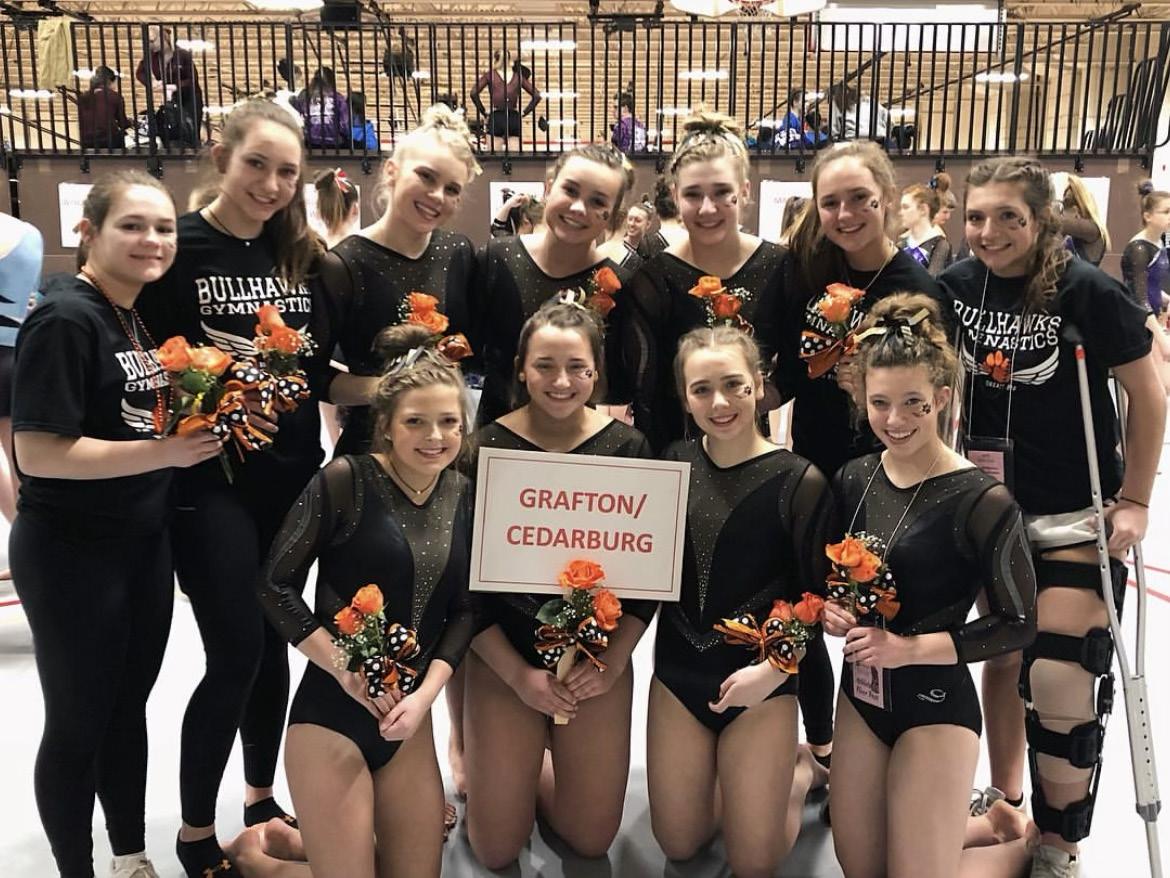
“I have competed as a gymnast for over 10 years, and my teammates became some of my closest friends. We not only worked together as a team, but we supported each other through the ups and downs of life,” Ketelhohn says. “I received this shirt during my favorite season of my career, my junior year of high school. Our coach designed these shirts to highlight our state qualification and represent the years of hard work we put into getting to that point.”
Showing her T-shirt, Ketelhohn relives her memories with her teammates and friends, excited to head back home to cheer them on during their next competition.
“I grew up not too far from Marquette, so when I travel home, I typically watch my younger teammates compete on my old high school team. This shirt is a constant reminder of how much my team and the sport mean to me,” Ketelhohn says.

Although she is no longer a part of the team in the same way she used to be, she continues to support them from campus and remains proud of their achievements.
By simply looking at the items that have made people who they are today, it may be easy to see the person they truly are. It could be said that many items a person owns show a connection to someone they lost, the person they were before coming to college or something that has been with them since childhood. Many people have one thing that holds a special place in their hearts, even if they have yet to realize it yet.
Arts
photo ISAAC PITNER
photo MIA KETELHOHN
spring 2023 47
photo ROSIE STONE
stream the louder than words playlist now


 photos ISABEL BONEBRAKE, FORSTER GOODRICH
photos ISABEL BONEBRAKE, FORSTER GOODRICH


 pictured SEAN O’KEEFE
pictured SEAN O’KEEFE
SpRIng fAsHION
SpRIng fAsHION
SpRIng fAsHION
SpRIng fAsHION
SpRIng fAsHION
SpRIng fAsHION
SpRIng fAsHION
SpRIng fAsHION

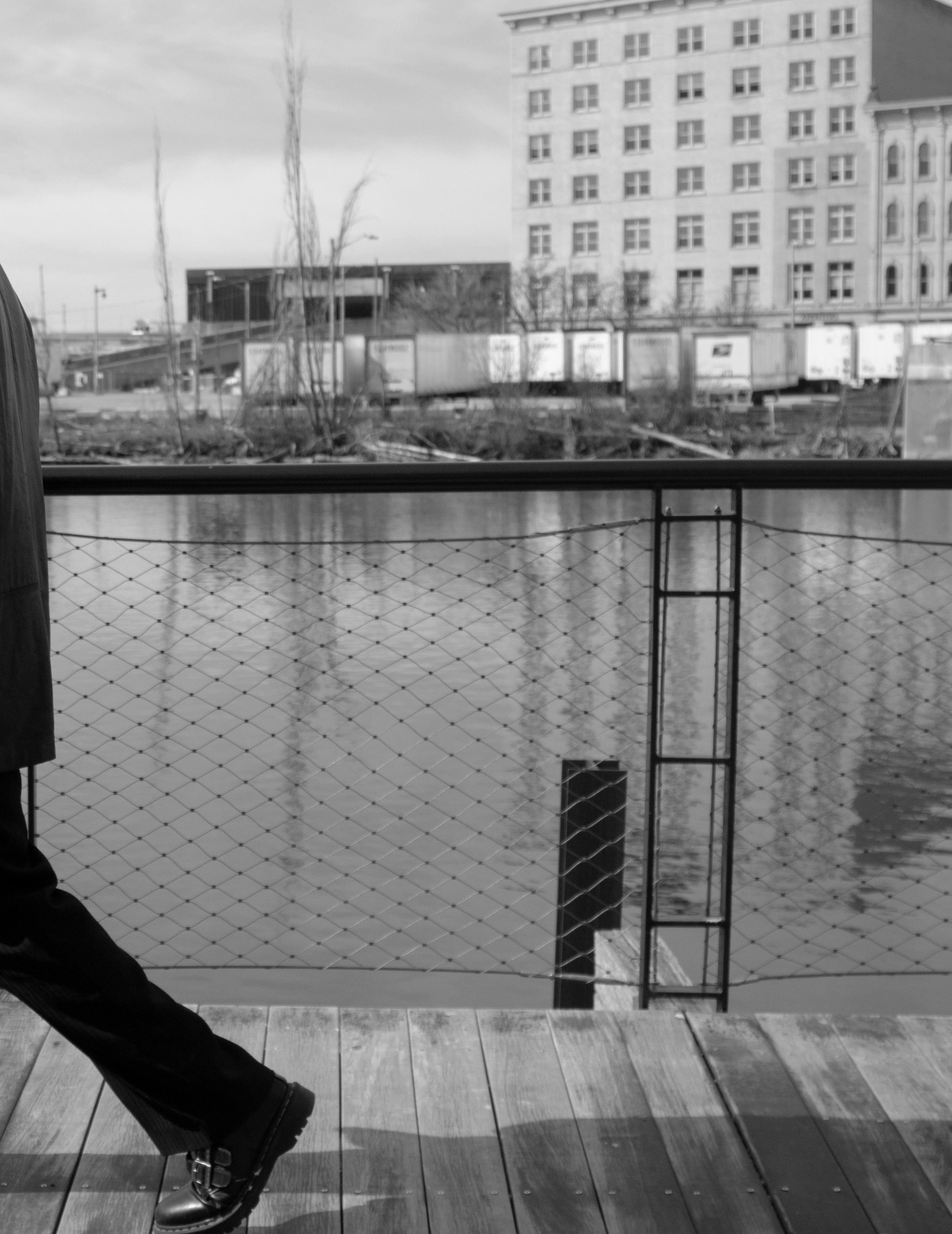

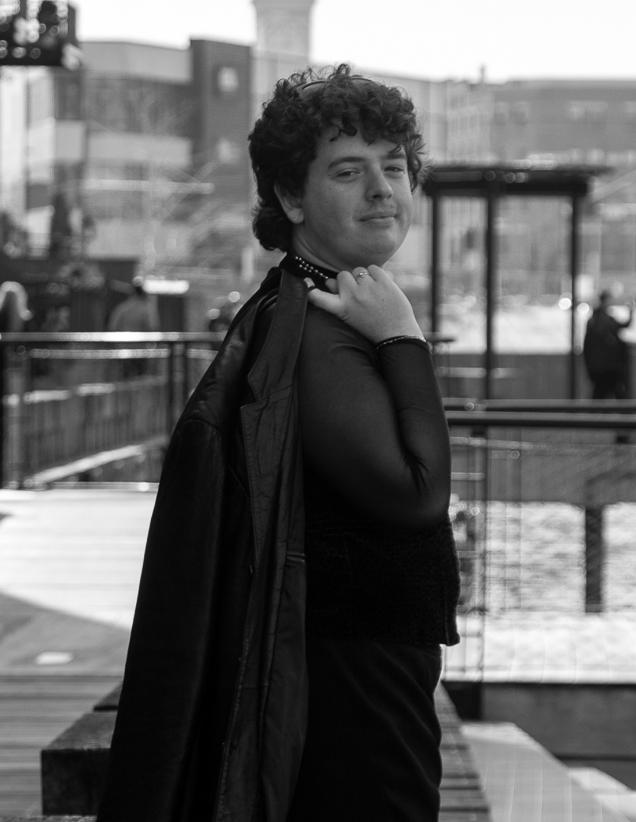
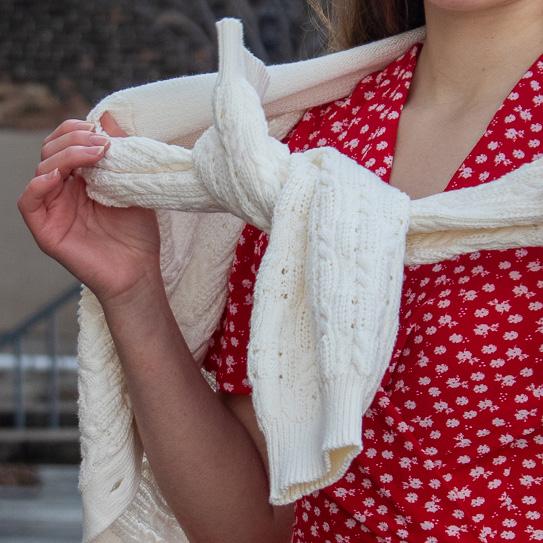




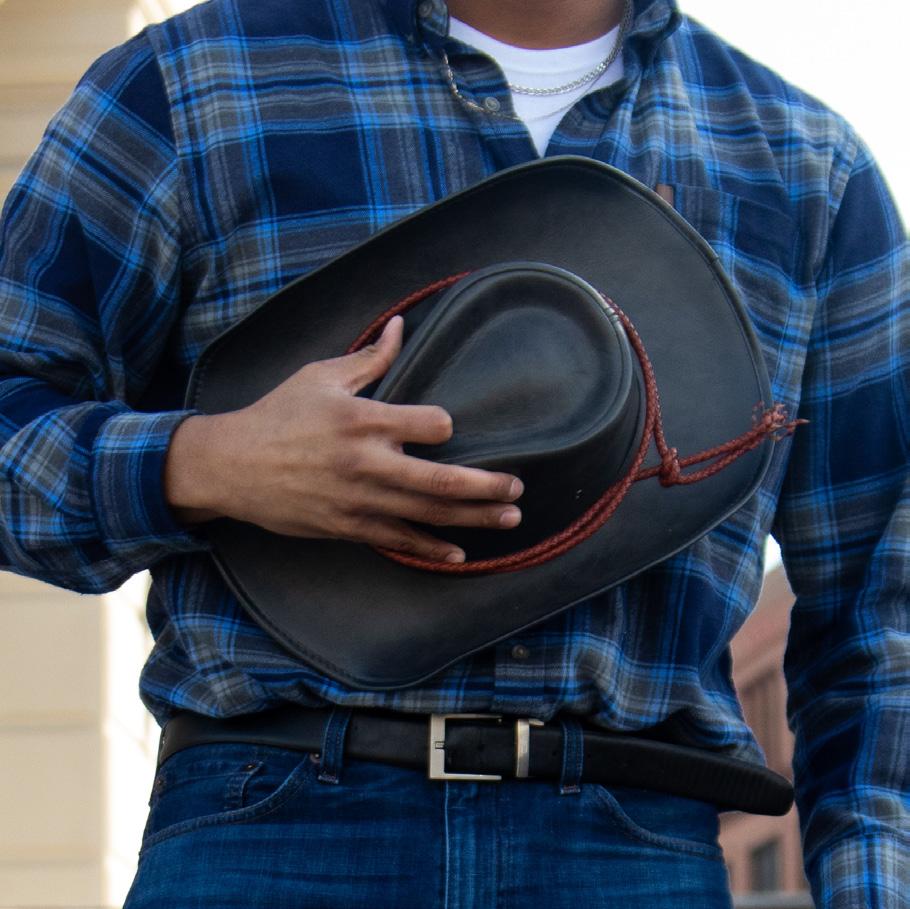 pictured CHRISTOPHER MOORE, GRACE KADONSKY, SYLVIA ZMUDZINSKI
pictured CHRISTOPHER MOORE, GRACE KADONSKY, SYLVIA ZMUDZINSKI
There are certain feelings that cannot be described through words alone. This was the case for senior women’s basketball member, Nirel Lougbo, who didn’t have the words for what she felt when she first toured Marquette back in 2018.
“I feel like a lot of people always hope to feel ‘That moment, that thing that makes you want to be here,’” Lougbo says. “And there was a moment when I was with the team in the locker room and everybody was together, hanging out, something very normal. And while I was there, I got that feeling that this is where I was supposed to be.”
Without question, Lougbo committed to play at Marquette and made the 1,086 mile leap from her home in North Andover, Massachusetts to what would become her new home in Milwaukee, Wisconsin.
In her first year as a Golden Eagle, Lougbo played in each of Marquette’s 32 contests.
But when her sophomore season rolled around, Lougbo was redshirted. The following season, Lougbo appeared off the bench in just six games after suffering a knee injury.
Today, Lougbo remains on the team, despite being medically disqualified.
“The last two years were definitely the hardest that I’ve ever had to go through in my life, just mentally and physically the whole thing all together,” Lougbo says. “It was definitely tough, but I’m just thankful for the people and the relationships that I’ve made here that have made it a little bit easier during those times.”
One of these people is Lougbo’s teammate and roommate of the past four years, Senior Guard Claire Kaifes.
“Nirel is probably one of the funniest people I know. She’s absolutely hilarious, but she also takes that time to really get to know you, really have those solid conversations,” Kaifes says. “She’s one of the best friends I have and she’s great at balancing being funny while also taking care of business.”
Kaifes says she can always turn to Lougbo as a positive light on the team.
“When she was a player, she was a great player. She had a great IQ, great experience,” Kaifes says. “But then when she was injured, she took on more of that, ‘pull you aside, be a leader, one on one’ role. I think now that she
BONEBRAKE
Sideline Sideline Sideline Sideline Sideline
has been ruled out, she’s taken advantage of that role.”
Kaifes, a senior guard who has also had her experiences with injury and recovery, says the connections Lougbo establishes with each and every coach, manager and player is what makes her presence so impactful.
“Whenever I was having a bad day, she was always there talking about her experiences from the year before and stuff like that,” Kaifes says. “She was always just a great listener for me, and I feel like I can reciprocate that also with her.”
Part of Lougbo’s bright light comes from her shiny smile, which is fitting as she will be starting dental school at Marquette next year.
“I decided to take the pre-dental track because I come from two parents who immigrated to this country and they never had those types of resources,” Lougbo says. “When I was growing up, they, like any parents, always wanted me to have the things they didn’t have and one of those things was dental care. Some people in my family, today, who live in Africa still might not have that same access. It’s something that I felt like I needed to do.”
Kaifes says Lougbo is always someone laughing and smiling. For Lougbo, she seeks to help others share their own shining smile.
“A smile is something that radiates so much onto someone else, and seeing someone with a nice smile and all these things, how that can change someone’s life,” Lougbo says. “I just knew I wanted kind of to be a part of that process for somebody else.”
Despite the academic challenges that result from being a D1 athlete on the pre-dental track, Lougbo says the team keeps her motivated. In return, she is a bright smile, a shoulder to cry on and a go-to listener for them.
Though this season marks the end of an era for Lougbo with the Golden Eagles, Head Coach Megan Duffy says she couldn’t be more excited and proud of the senior.
“Having her (Lougbo) around the team and in our locker room is wonderful,” Duffy says. “She’s one of the funniest people I’ve been around, she has a great personality and great IQ of basketball. In fact, she’s continuing to help some of our younger players and all the little things she’s adding to our team makes her that much greater to have around.”
54 spring 2023 Sports
words AVA MARES photo
ISABEL
Voice Voice Voice Voice Voice THE A
FROM
A A A A
but then when she was injured, she took on more of that, ‘pull you aside, be a leader, one on one’ role. I think now that she has been ruled out, she’s taken advantage of that role.”

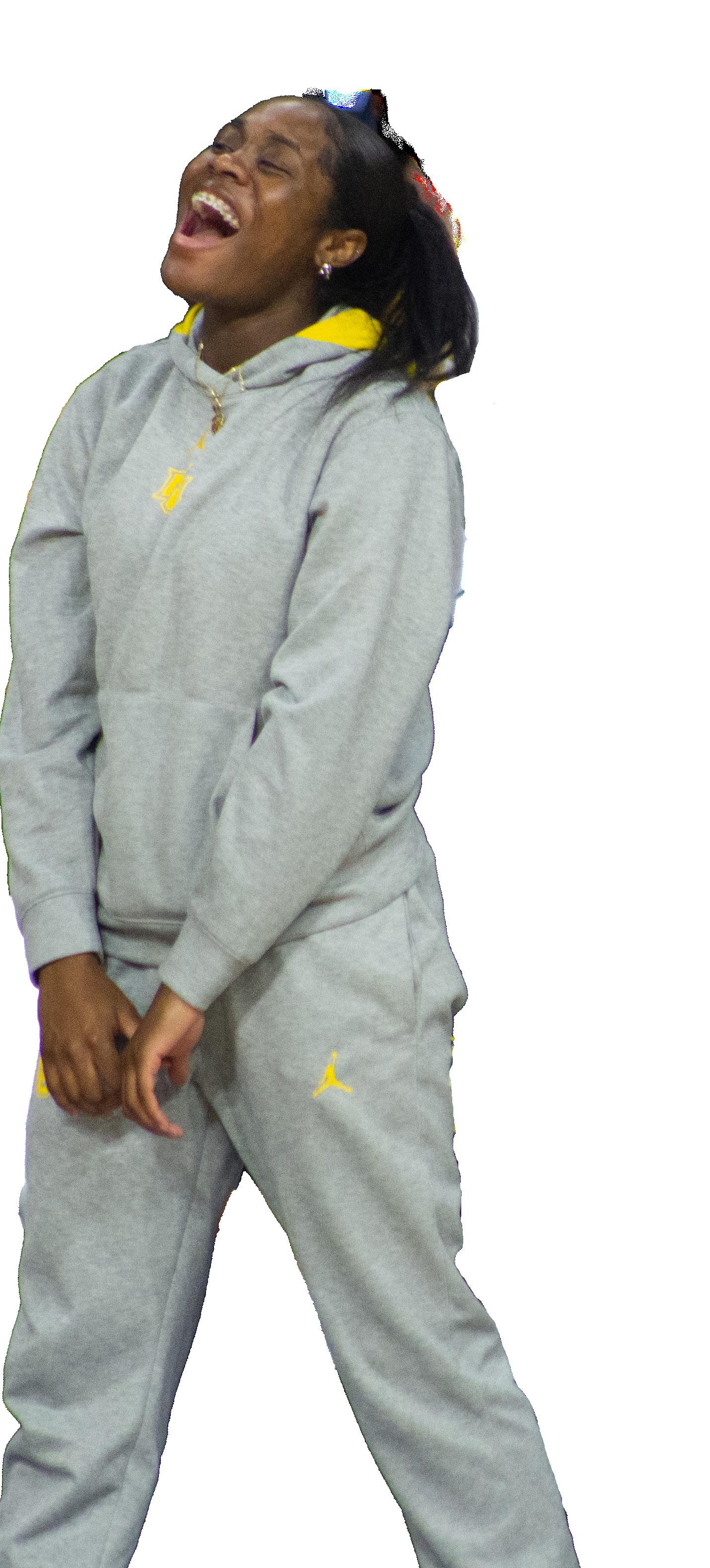
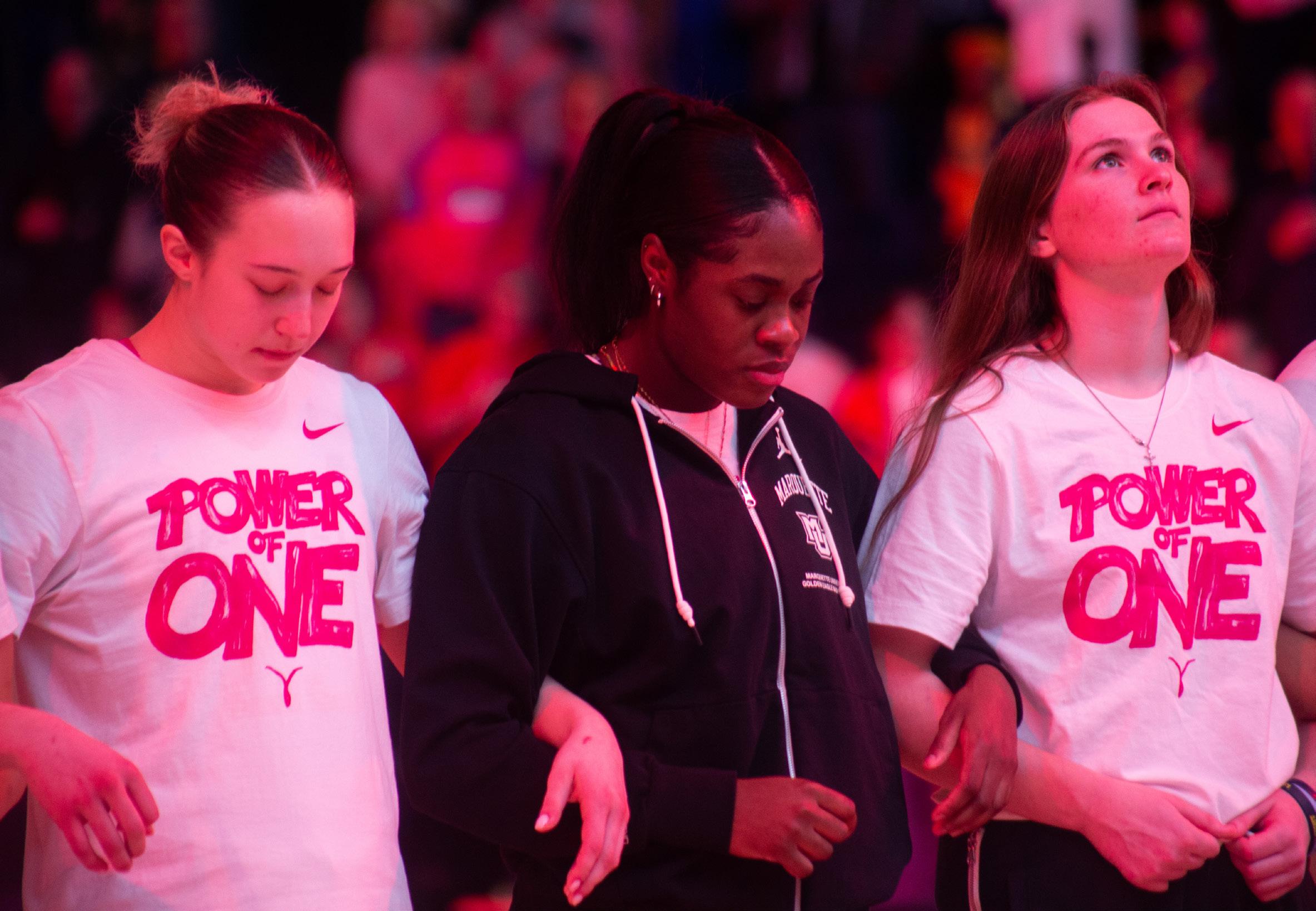
Sports
CLAIRE KAIFES
LEGACY iN THE MaKING
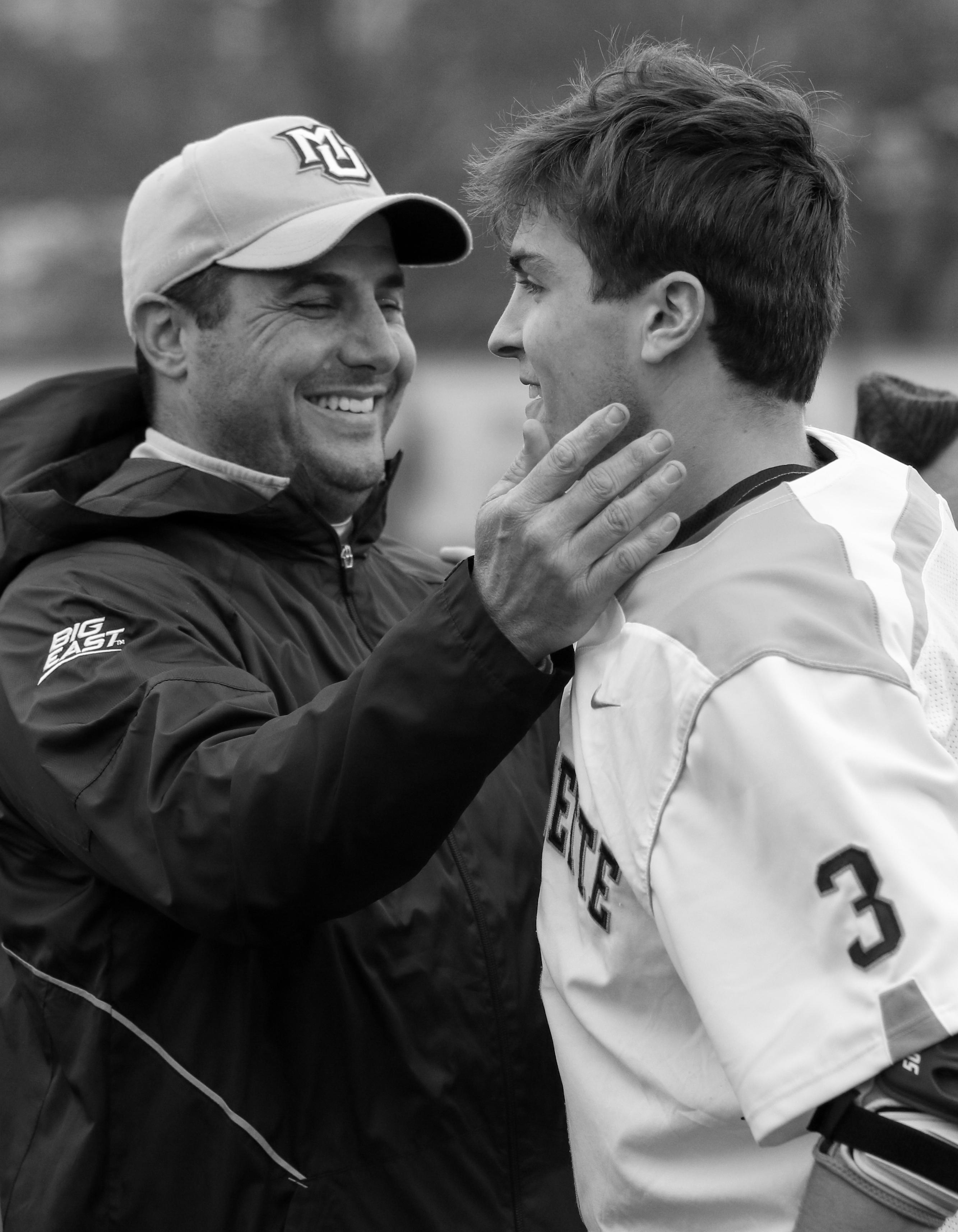 words TREVOR HILSON EMMA KROLL
photos courtesy of MARQUETTE ATHLETICS
words TREVOR HILSON EMMA KROLL
photos courtesy of MARQUETTE ATHLETICS
Twelve years ago, deputy athletic director Mike Broeker approached executive associate athletic director Danielle Josetti with an idea: Division I lacrosse in Milwaukee.
“We’d been in the Big East for a while, and he was researching lacrosse. We didn’t have a spring team sport that could drum up a lot of community support,” Josetti says. “(Broeker) was the brains behind the operation regarding why lacrosse made sense. And then, as he presented it, I would be on board.”
The idea came to fruition December 16, 2010 when Marquette Athletics announced it would add the first Division I lacrosse programs in the state of Wisconsin.
Marquette became just the third university to sponsor Division I men’s lacrosse and fourth to sponsor Division I women’s lacrosse in the fivestate region of Michigan, Indiana, Illinois, Minnesota and Wisconsin at the time.
Following a national search, Marquette hired two young coaches, Joe Amplo and Meredith Black, to lead the men’s and women’s lacrosse programs.
Amplo says the program was being built for the long run, a 20-year investment from Marquette.
“The results were unimportant to us because we knew we were short-handed in some ways,” Amplo says. “We couldn’t go back and redo our culture and the foundation that we were going to set that hopefully still exists today and beyond. We wanted to build a culture that way down the road, 20 years from now, we’d still have the fabric of Marquette lacrosse that would still be felt and seen by what those early teams did.”
Following an entire calendar year of solely practicing, both programs began competiting in the spring of 2013 as an independent. Then a year later, MU became a full member of the Big East Conference in men’s and women’s lacrosse in 2013-14.
Andrew Smistad, a captain on the inaugural men’s team, talks about the culture created from the program’s outset.
“It is still like a culture of hard work,” Smistad says. “And, both the strength staff and our coaching staff worked hard. So, we set that standard for what it meant to be a Marquette lacrosse player.”
That culture was translated to the women, as well.
“The culture emphasized being a family and hustling,” former defender Elizabeth Goslee says. “We might not have the level of a senior skill-wise yet, but we’re passionate and aggressive, and we’ll hustle all over the field. So that was the day in, day out, practice and games. It was just building the identity of what we wanted our lacrosse team to be like at campus.”
The recruitment process presented early challenges, as the new program had to find players willing to buy into midwest lacrosse. Black says competing with the east coast was one of those challenges.
“‘Why would I travel to Milwaukee to play lacrosse when I can drive an hour and have a great program in my backyard?’ There are so many great programs on the East Coast,” Black says. “That’s been the hardest challenge of growing the sport in the area, but also growing the sport nationally to say, ‘Hey, Milwaukee can host a Division I lacrosse team.’”
Both programs have been brought up together through growing pains. In 2019, Andrew Stimmel became the head coach after Amplo left for the United States Naval Academy.
However, the relationship between the two programs and coaches did not falter. Instead, Stimmel says his bond with Black has helped both squads flourish.
“Meredith and I are close,” Stimmel says. “She’s been great in terms of being able to pick her brain on some of the things that she did in her first couple of years. …. She and I have a great relationship and work together to figure out how to have lacrosse positively impact campus.”
Black says progress and change has occurred on the women’s side since its inaugural season.
“We’ve gotten better every single year in one, two or more categories,”Black says. “Every year has been we’re taking a step forward or taking a step up. Some of those years have been small steps, like maybe little bit more insignificant, and some years just like big steps.
“It’s slower than what I was originally envisioned, I would have liked that to move faster, but at the same time, I appreciate seeing the progress and watching the team grow.”
Halfway through the initial two-decade plan, Amplo says he is excited about the next ten years of Marquette lacrosse.
“Andrew and his staff are doing such a great job. They’ve got tremendous talent and they’ve got an edge to them,” Amplo says. “He is bringing in kids that add much depth to the program. In my opinion, they’re the second most talented team in the Big East this year. They will have a chance to make a run as the season progresses. I think that’s what you’ll see for Marquette lacrosse for the next ten years.”
Stimmel said to continue pushing the needle forward in the long run on the men’s side, it will come from finding similar types of players that resemble the makeup and DNA of earlier championship teams
spring 2023 57 Sports
We wanted to build a culture that way down the road, 20 years from now, we’d still have the fabric of Marquette lacrosse that would still be felt and seen by what those early teams did.”
JOE AMPLO
at Marquette.
“We’re really going to roll up our sleeve and get to work,” Stimmel says. “I don’t think it’s something that we have to look at within our conference and say, ‘Hey, we have to out recruit Georgetown or Villanova or these other teams,’ we just have to find really the right people.
“And we think if we find the right people in the right fit, ultimately, we’re going to be able to play great lacrosse and compete for a championship. … We want to make a run and get to a Final Four and that might be

a crazy goal from the outside perspective but that’s something that we believe if we do it the right way that we can accomplish.”
Black said, as her team’s goal is to compete for Big East championships, the program is looking towards building consistency and dominance within the conference like Denver.
“That’s our goal, to be the team that everyone fears and everyone is ‘Marquette has the team that is really hard to beat,’” Black says.
Both programs have seen success halfway through the initial
20-year investment.
In 2016, Amplo and Marquette earned its first ever bid to the NCAA Tournament after upsetting then No.1 Denver, the defending national champion who had never lost to a Big East foe, to win its first Big East Championship title.
The Golden Eagles then defended their crown in 2017 winning back-toback Big East titles. Fast forward to this season, Marquette earned its first top-ten victory since 2018 when it defeated then-No. 5 Penn State March 18.
58 spring 2023 Sports
Meanwhile, on the women’s side, Black’s squad saw its best season come in 2019. The Golden Eagles made the postseason for the second time in as many years, earning its highest-ever seed in the conference tournament (No. 2), while securing their first-ever triumph over a top-25 opponent on Senior Night against then-No. 25 Georgetown.
Black’s crew is out to its best start in program history this season at 8-1 as of March 25.
Broeker says the lacrosse program has reached incredible heights in its
first 10 years.
“It’s remarkable,” Broeker says. “I’m super proud of what Joe did here and appreciative of everything he’s done and Andrew is continuing that. On the women’s side, Meredith is the only coach we’ve had and we sincerely appreciate her.”
“Reflecting on the ten years, it’s remarkable that season on the men’s side, where we were a national seed in the NCAA Tournament. In the 20 years I’ve been at Marquette University, it is the most remarkable coaching program, management, the individual
season I’ve seen.”
Former men’s lacrosse midfielder and now assistant coach Jake Richard says it’s all about the love in the program that has set its legacy now in its 10th season of competition.
“Love is the word we like to use a lot,” Richard says. “The alums care a lot about this place, not because of the wins and losses, but because of the experiences they had together, challenging each other and helping each other grow into the people they are today. And so I’m proud of it.”

spring 2023 59 Sports
ON THE MIC
ON THE MIC
 words
words
The lights dim, the fire cannons are ablaze and the crowd begins to cheer as the hype video plays on the jumbotron. But whose voice comes booming through the arena that makes everyone go wild?
That would be none other than Marquette’s public address announcer, Mike Jakubowski.
Jakubowski has been announcing the basketball programs since 2004. As a Marquette alum, Jakubowski says that it has been a dream come true working for his alma mater.
“It’s insane. It’s wonderful,” Jakubowski says. “I’m not kidding, every time I walk in there, I can’t believe that it’s my voice that’s coming out of the microphone.”
Jakubowski also serves as the Director of Video Operations at the Panther Arena, home of the University of Wisconsin-Milwaukee Panthers. Despite all the hats he currently wears, he says that the job never gets old.
“It doesn’t matter if there’s two people there, if there’s 50 people there, if there’s 14,000 people there if it’s a full stadium,” Jakubowski says. “Every single time you show up and have a microphone in your hand, it’s an honor to present those elements.”
Bob Brainard, a former Marquette PA announcer, says that Jakubowski brings immense energy and devotion to his role.
“He’s a Marquette guy,” Brainard says. “He comes off as a true alum with his passion for bringing enthusiasm to the Marquette basketball
games, men’s and women’s. You don’t always have to be an alum, but in Mike’s case, it helps him do his job and he doesn’t have to fake it.”
Jakubowski says he learned about the job opening from a former Marquette graduate, who was the PA announcer for the women’s program at the time.
“Prior to my first season, she came home from a women’s basketball game and the producer she was working with said they were looking for someone for the men’s program,” Jakubowski says. “I looked at her and said, ‘Throw my hat in the ring.’”
Before Jakubowski agreed to audition for the role, he called Brainard, who was being replaced, to ask for his consent.
“He wanted my blessing,” Brainard says. “The fact that he would call me, the fact that he was conscious enough to say, ‘Hey, I don’t want to hurt your feelings.’ It speaks volumes of who he is.”
Jakubowski says that with new positions, he always strives to be compassionate and appreciative, which is why he did not hesitate to reach out to Brainard.
“I had always wanted to be very respectful of those that preceded me and then eventually whoever replac-
es me,” Jakubowski says. “I wanted to reach out and just get a sense of what had happened before, to acknowledge that contribution and then with my opportunity to move forward.”
Brain Begley, Director of Game Presentation and Fan Experience at Marquette, works closely with Jakubowski during each game.
“He’s not just content with what’s he doing,” Begley says. “He’s always trying to find ways to be better at what he does and continue to grow and challenge himself. That’s important too for someone who’s been doing it and is a pro, but it’s never settled.”
An example of this mentality is shown in the age-old call and response between Jakubowski and the band at the end of
every game. The band says, “Goodnight, Mike!” and Jakubowski responds, “Goodnight, band! Be nice.”
60 spring 2023 Sports
KAYLYNN WRIGHT photo KEIFER RUSSELL
He’s a Marquette guy. He comes off as a true alum with his passion for bringing enthusiasm to Marquette basketball games...”
BOB BRAINARD
“That’s been a tradition forever at Marquette, preceding me,” Jakubowski says. “Part of being a ‘Marquetter,’ you attack it from a different angle. My little twist on it is my dad always told us to be nice, so I always tell the band to be nice.”
Mari Crowley, a sophomore in the College of Communication, says that as a pep band member, she could not imagine another voice echoing throughout the arena.
“His voice is just so iconic and recognizable that it’s always so exciting to hear,” Crowley says. “(He) just always brings the hype. If it was anyone else, I can’t believe that it would be anymore exciting because it is always just incredible.”
Despite the intense energy that
his intense focus during the games.
“Physically sitting down in the eye of the hurricane, that’s where it’s the calmest,” Jakubowski says. “You have to be calm in listening for information from referees (and) your producer. Every single thing that comes out of your mouth has to be right at all times. There’s a concentration level that separates you from the overall event.”
Brainard says that Jakubowski’s focus combined with his sense of humor is how he excels at his craft.
“We have this silliness and we don’t take things too seriously,” Brainard says. “It’s a fun gig, we both know that. We always say we have the best seat in the house. But it is a job, and it is important, and you

building hears.
“There’s a time to have fun and it’s great to be there and to watch your teams front and center. But, at the same time, we want to get the calls right. We want to get the names right.”
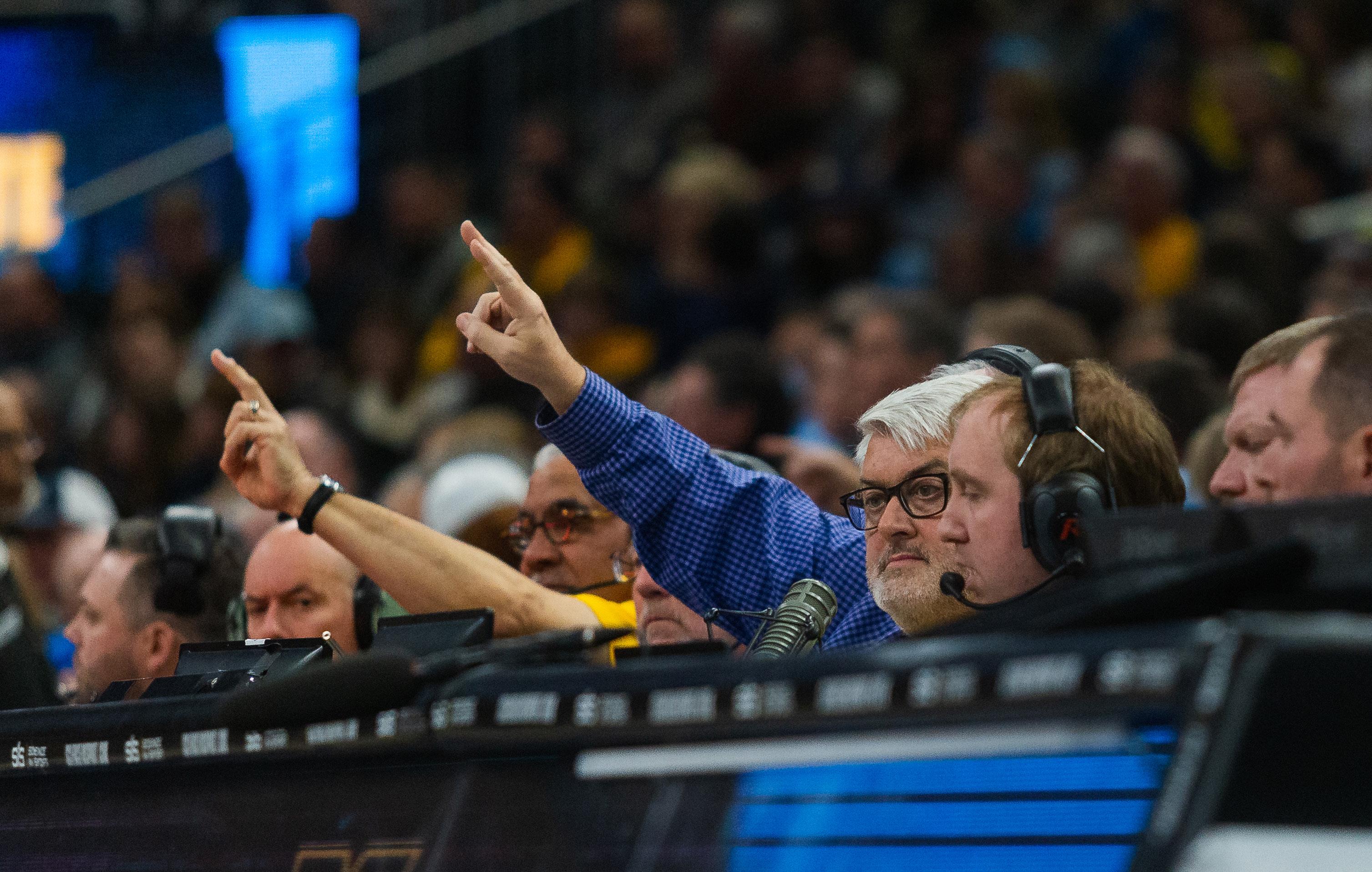
As the game ends and the music fades, Jakubowski says that his job brings him constant happiness in everything he does.
“It’s a joy every single time,” Jakubowski says. “Every single time I walk in there, through the tunnel, into the opening and the light hits you and you see the cheerleaders warming up and you hear the band warming up and the players are out stretching. Every single time, it just energizes me and it’s impossible not to.”
Sports
spring 2023 61
words JACK ALBRIGHT
If you look at both Marquette tennis rosters, one thing will jump out at you: a heavy international presence.
The women’s program has six international players while the men’s has five. These international athletes make up almost 50% of both teams and come from everywhere, spanning from New Zealand to Brazil to Switzerland.
Director of tennis and head coach of both programs
Steve Rodecap says that tennis’ popularity in the rest of the world makes it easier to develop talented players.
“In Europe, the design is completely different than it is here,” Rodecap says. “You can have less resources and be successful over there versus here. You’re getting better athletes there (Europe) where financial restrictions have less of an influence.”
The road to college is long for international players.
First, players get on colleges’ radars after a few years of participating in tournaments. The International Tennis Federation sanctions various tournaments throughout the world that teenagers play in and then are given a ranking for their class.
But that’s just the beginning.
Through coordination with agencies that act as middlemen, players then are introduced to colleges. The agencies go to various tournaments to gauge participants’ interest in play-
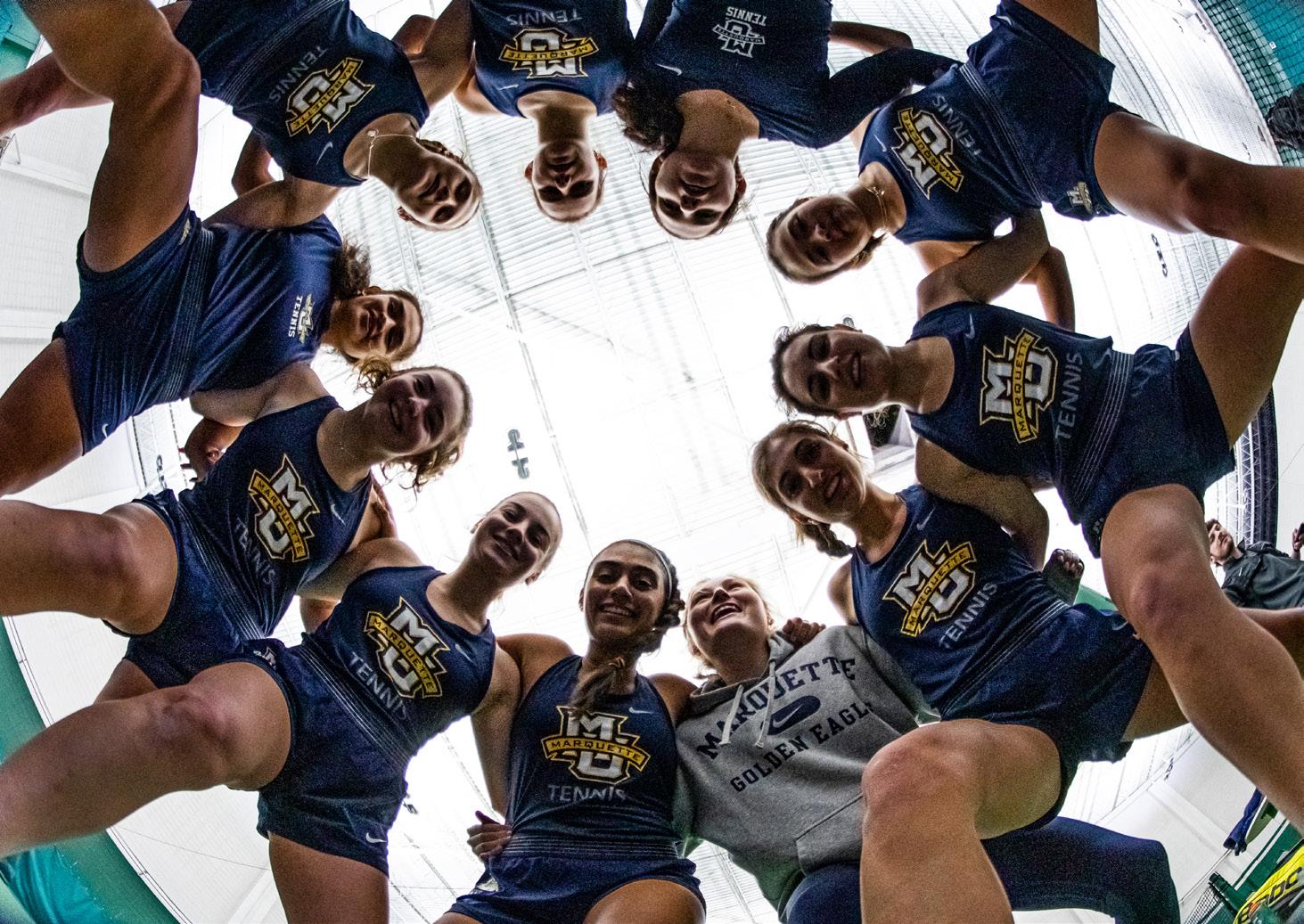
ing in college and how they can help with the process.
Once the players sign with the agencies, colleges receive player rankings and videos from tournaments that the agencies send over.
Rodecap says the process of recruiting international players is difficult because many players feel as though they are going professional.
“Typically, your top 30 kids in
person. That’s really important for us because videos only do so much,” Rodecap says. “Trying to get a feel for what type of person they are and what kind of relationships they have with their coaches, kind of relationships they have with their parents.”
Before COVID-19, the coaches would go overseas to watch recruits play live.
“We do a home visit or just visit the country or the city where they’re coming from and see them practice,” associate head coach of the women’s team Dusan Medan says.
Now, through and after COVID-19, the teams are not able to travel, forcing them to rely on other parties like the agencies.
But the athletes also play an important role.
the ITF, maybe even top 50, all think they’re going pro, which is probably not the case,” Rodecap says. “It’s hard to convince a 16-year-old otherwise and that maybe college would be the best option.”
For the athletes that are interested in playing collegiately, the videos and rankings that agencies send don’t paint the full picture.
“We would try to see them play in
“Once you bring a couple of [international students] to a program, a couple of international students,
Sports
The international players just bring something different compared to others, because we have different culture, different languages,”
62 spring 2023
GIULIA TURCONI
they recruit a little bit for you as well. … It’s all connected,” Medan says.
Senior Giulia Turconi was born in Como, Italy and went to the University of South Carolina before Marquette.
When it came to moving to the United States, it was hard to overcome logistical difficulties in communicating with colleges.
“We have seven hours of time zone difference,” Turconi says. “The time zone difference is tricky.”
Turconi says that communication with South Carolina was done through social media, specifically Facebook and Instagram.
Marquette also takes advantage of social media, such as WhatsApp.
Rodecap says that the people he reaches out to are excited about the prospects of coming to America to play and that it can even be harder to recruit Americans to play for him.
“Most of those the time, those kids are really eager to talk to you,” Rodecap says. “They feel that’s a reward for them to talk to a college coach.”
However, it is a new dawn for Marquette tennis.
For the next two seasons, the programs are forced to play off campus due to construction to the Helfaer Recreation Center and Tennis Stadium. Along with that, both programs are moving to non-scholarship by the 2025-26 academic year due to budget cuts within Marquette Athletics.



Turconi says the team culture has benefited due to its diverse presence, but that will change in light of the new cuts the programs are suffering.
“The international players just bring something different compared to others, because we have different culture, different languages,” Turconi says. “It’s gonna be different in the future. I don’t know if it’s going to be
good or bad. That we’ll see about it.”
Medan says the cuts will force the teams to look more domestically and internally for players.
The new recruitment strategy may lead to more American players, but that isn’t something Rodecap is opposed to.
“There’s very little American presence in some programs, even some really good programs,” Rodecap says. “I’ve never gone that route because I value making sure that we have some Wisconsin kids on the roster, some Midwest kids on the roster and I’ve always tried to balance it that way.”
Even though Marquette can no longer offer the lucrative scholarships to players, Medan says the program is still in a good position when it comes to recruitment.
“We are in a position to still recruit at a high level,” Medan says. “A lot of that is personal, obviously creating personal relationships and developing personal relationships with the coaches and players in the country.”
Sports
photos courtesy of MARQUETTE ATHLETICS
TAeKWoNdO CLub words
JOHN GUNVILLE
Taekwondo is a whole lot more than people wearing colored belts and kicking things.
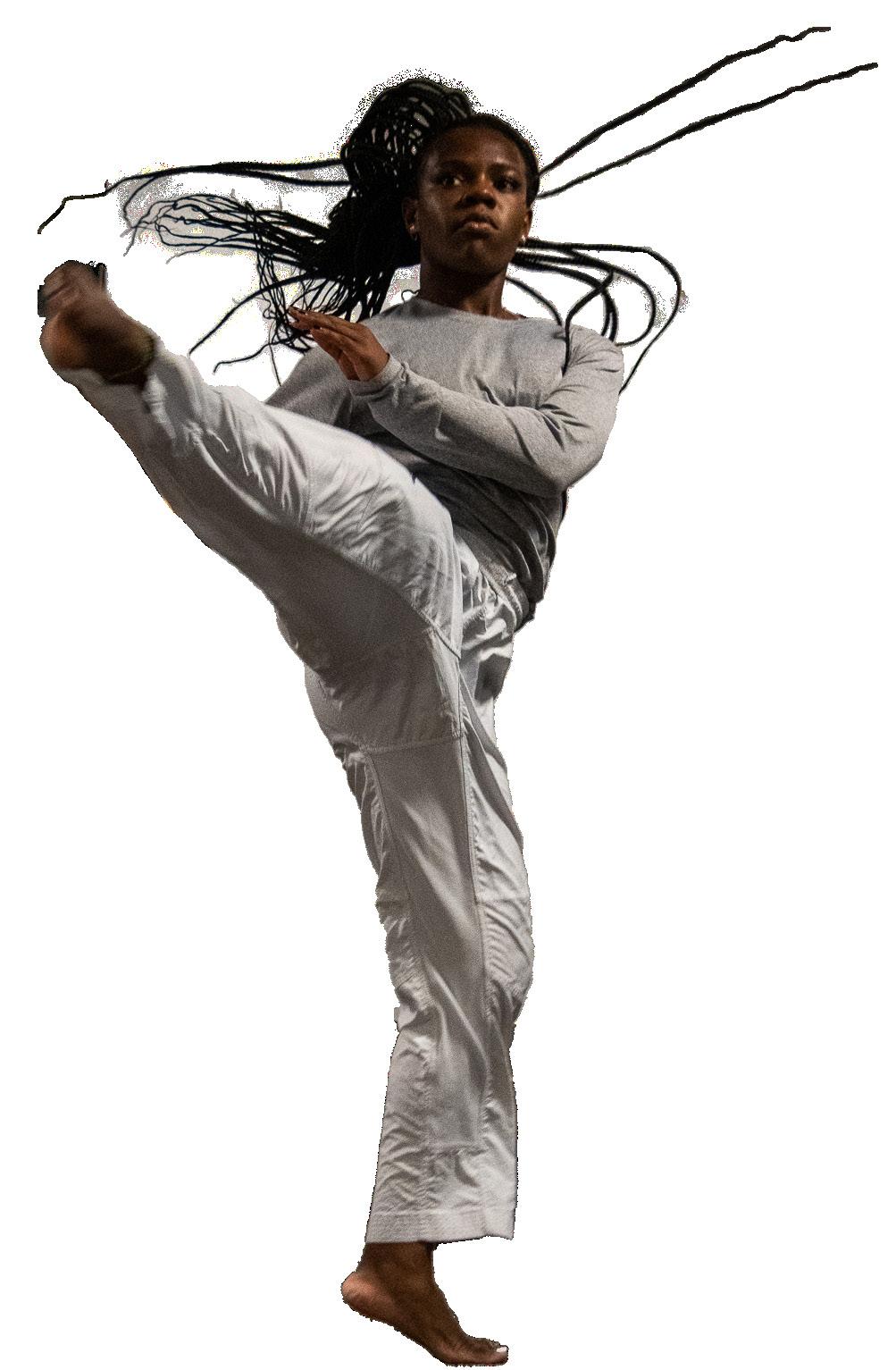
“Taekwondo is a lifestyle,” Marquette alum and club taekwondo team coach Matthew Lee says. “You get into it to learn a lot about Korean culture, about how your body is able to move and controlling the mind.”
Taekwondo traces its roots back more than 2000 years ago on the Korean Peninsula. The first modern taekwondo school opened up in Seoul in 1945.
Taekwondo is in Lee’s blood. His grandfather is Grandmaster J.K. Lee, a recipient of the Top Master Instructor award from the South Korean government. He has also opened taekwondo schools around Wisconsin and even trained the Marquette men’s basketball team.
“I’ve been doing this since I was five,” Lee says. “My father opened his school when I was four years old. That’s when I started. So I’ve been doing it now for 18 years.”
Discipline is one of the key teachings of taekwondo.
Senior club president Jordan Towe says the discipline he has learned through taekwondo has helped him grow in all aspects of his life.
“You can really do some serious damage to somebody who might not
be trained. So if you’re going to take these skills and apply it to anybody else, you need to know how to have self control and discipline to hold yourself back,” Towe says. “Not only does it help you master your emotions, and control yourself physically, emotionally and mentally.”
Towe has been able to achieve some of his life goals because of the hours he has spent training in
ence among club taekwondo members. Junior club member Jefferson Kim says his improvement in taekwondo has helped him find his voice.
“It’s building up your confidence, your self esteem,” Kim says. “You can apply it to your personal life. For example, when I was working
as an building
the Humphrey Hall practice room.
“It gives you discipline so that when you’re going to achieve something, you have the discipline to do it,” Towe says. “As well as the motivation and being the person who wants to.”
That’s a common experi-
and more direct experience that junior
been a major focus for sets of rules and ethics that come with it,”
the back of your mind having those intentions builds a foundation to that really do translate
64 spring 2023
With the wandering mind comes the quick snap reflexes to give up on something that’s hard, but they’re learning to persevere through it.”
MATTHEW LEE
photos FORSTER GOODRICH

room environments, building leaders in our community.”
In practice, mistakes are common, but Hernández says that the connection between the team allows for mistakes to be valuable learning experiences.
“When it comes to practice, we recognize it as a place where you can make mistakes,” Hernández says. “You want to make mistakes in practice because then you have the people of color belts that have more experience that can help you correct those moments.”
During practice, the taekwondo team fills the space with laughter.
“You’re jumping, moving around and things get slippery,” Hernández says. “When people fall, it’s a good laugh, but you have to always make sure they get back up and help each other out.”
Sharing smiles, laughing and having fun provide a contrast to the discipline of the sport. Hernández says that having a successful group depends on the balance of those factors.
“That laughter, goofiness, but coming together so often, you start building that community,” Hernández said. “It eventually becomes a routine where everybody just gets used to each other.”
The strong bonds within the team are crucial Lee says, because learning perseverance is harder alone than with others.
“With the wandering mind comes the quick snap reflexes to give up on something that’s hard, but they’re learning to persevere through it,” Lee says. “It’s just one of the few ways that we are able to spread the love of taekwondo.”


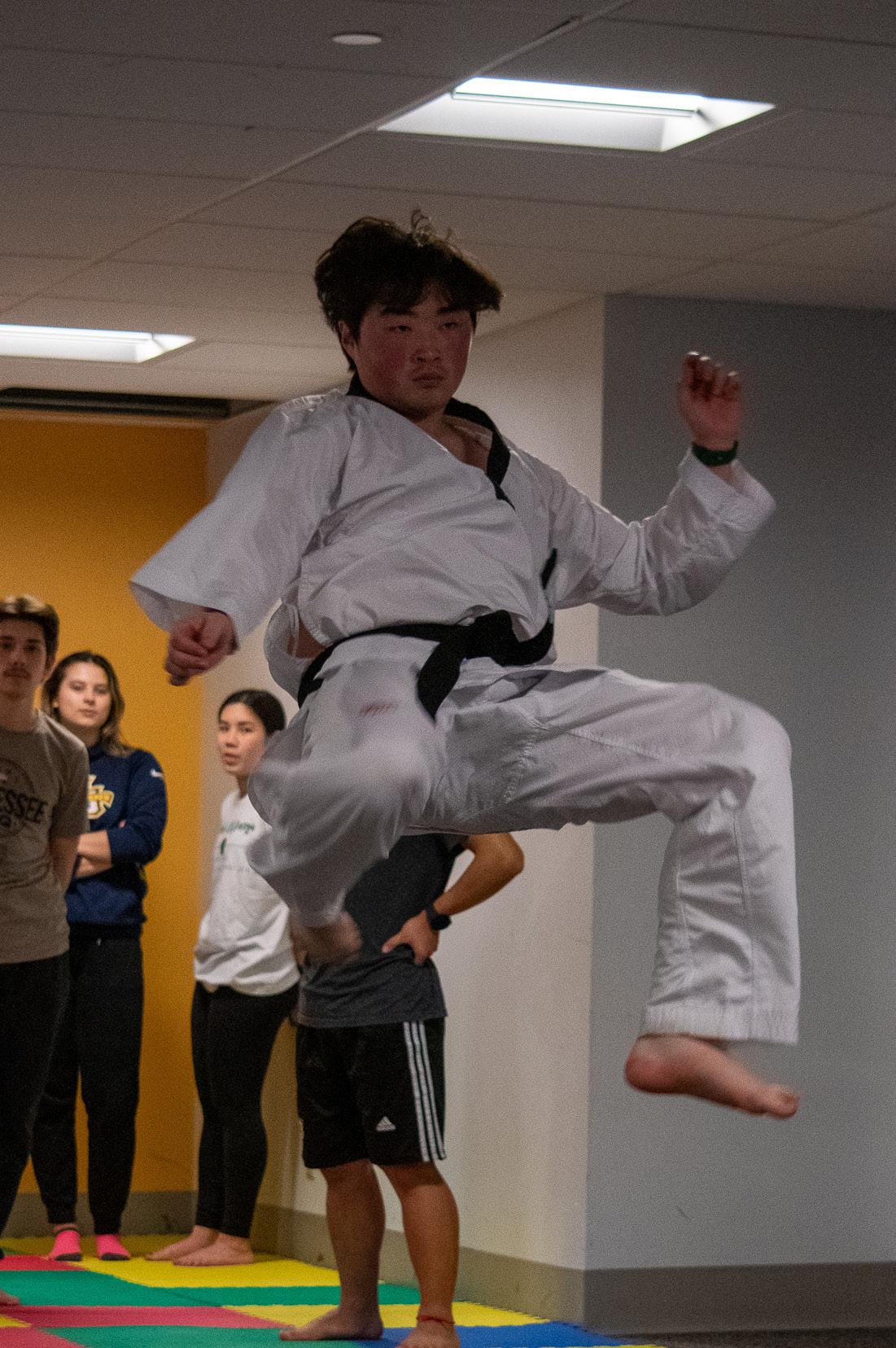
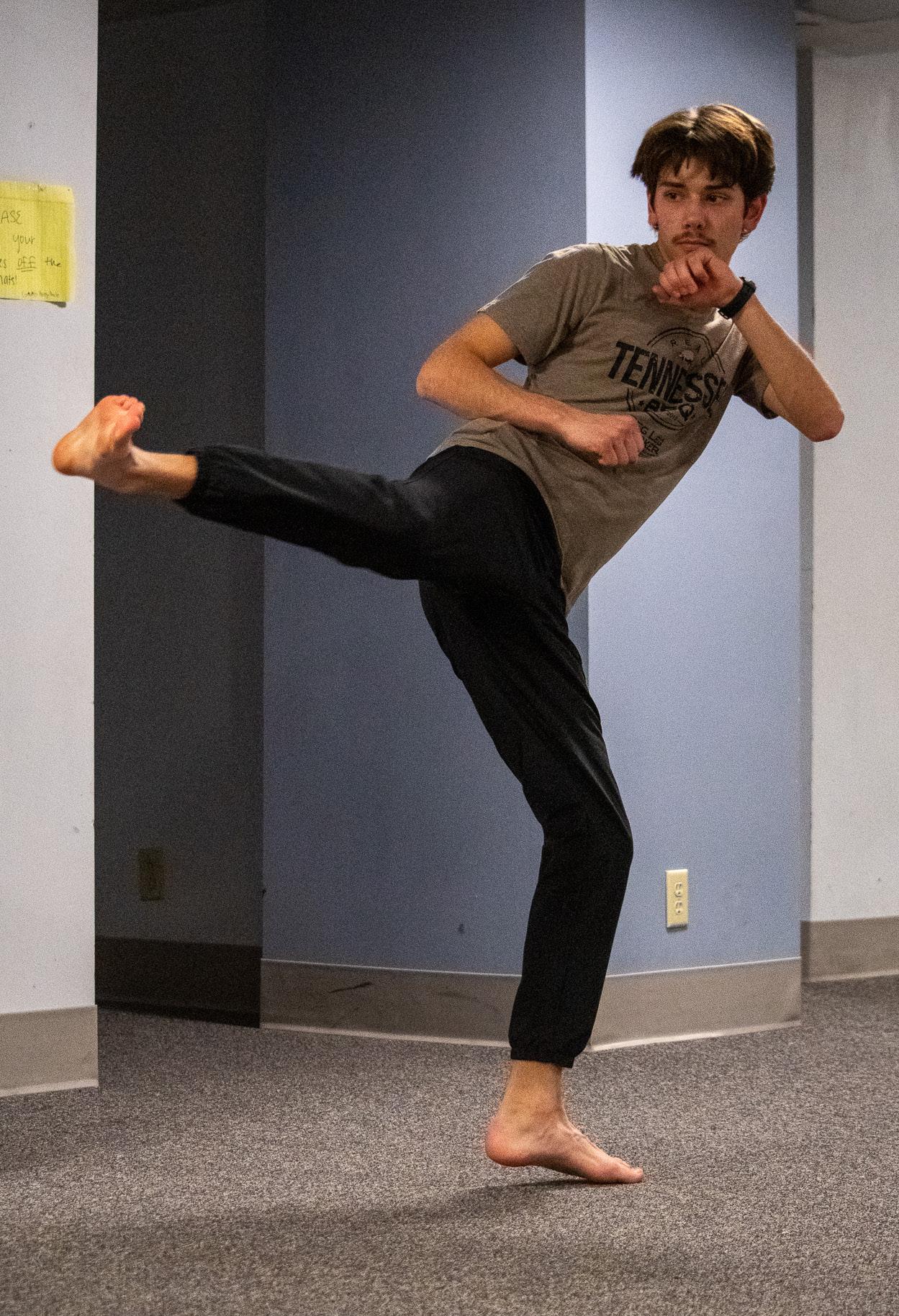
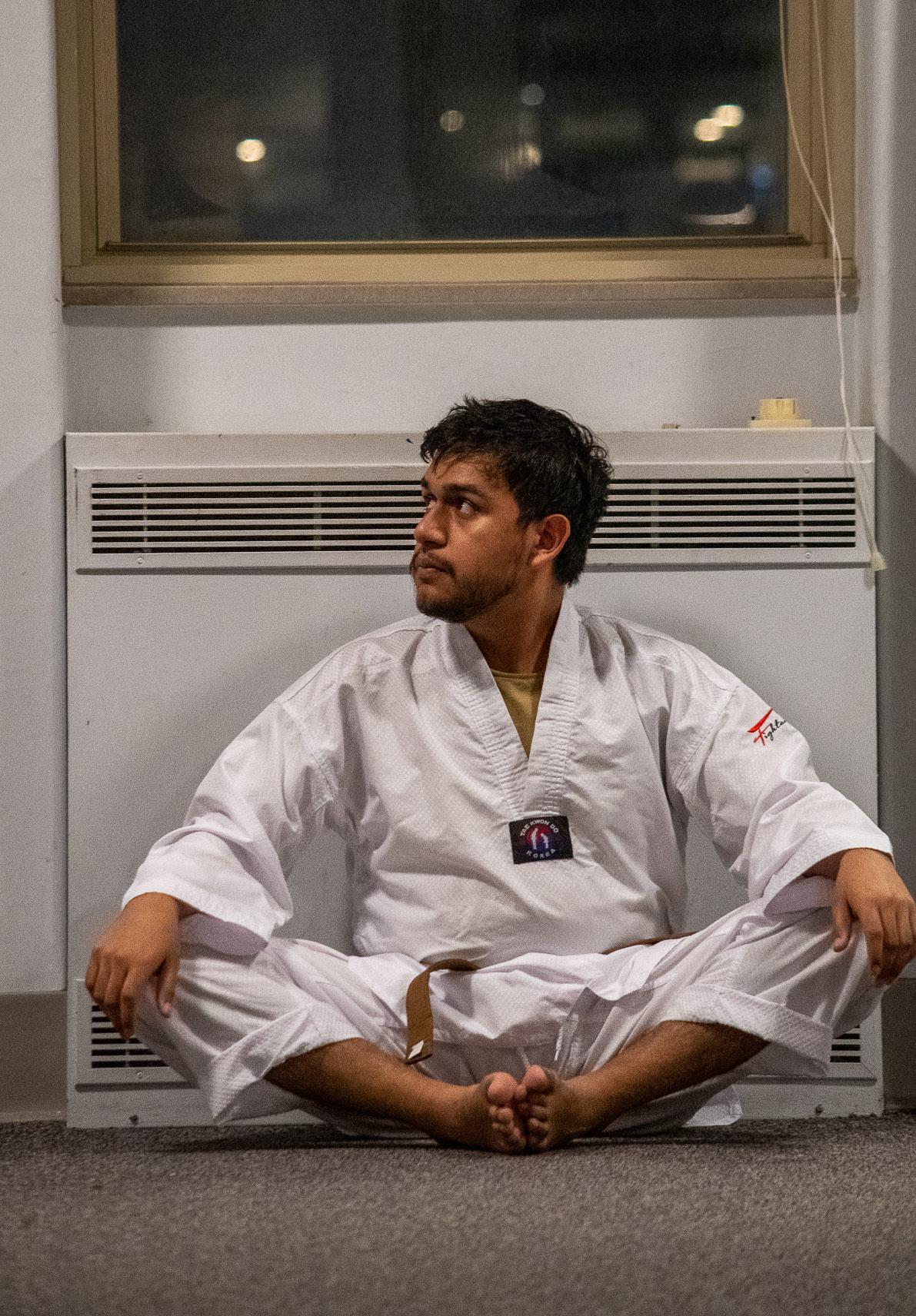
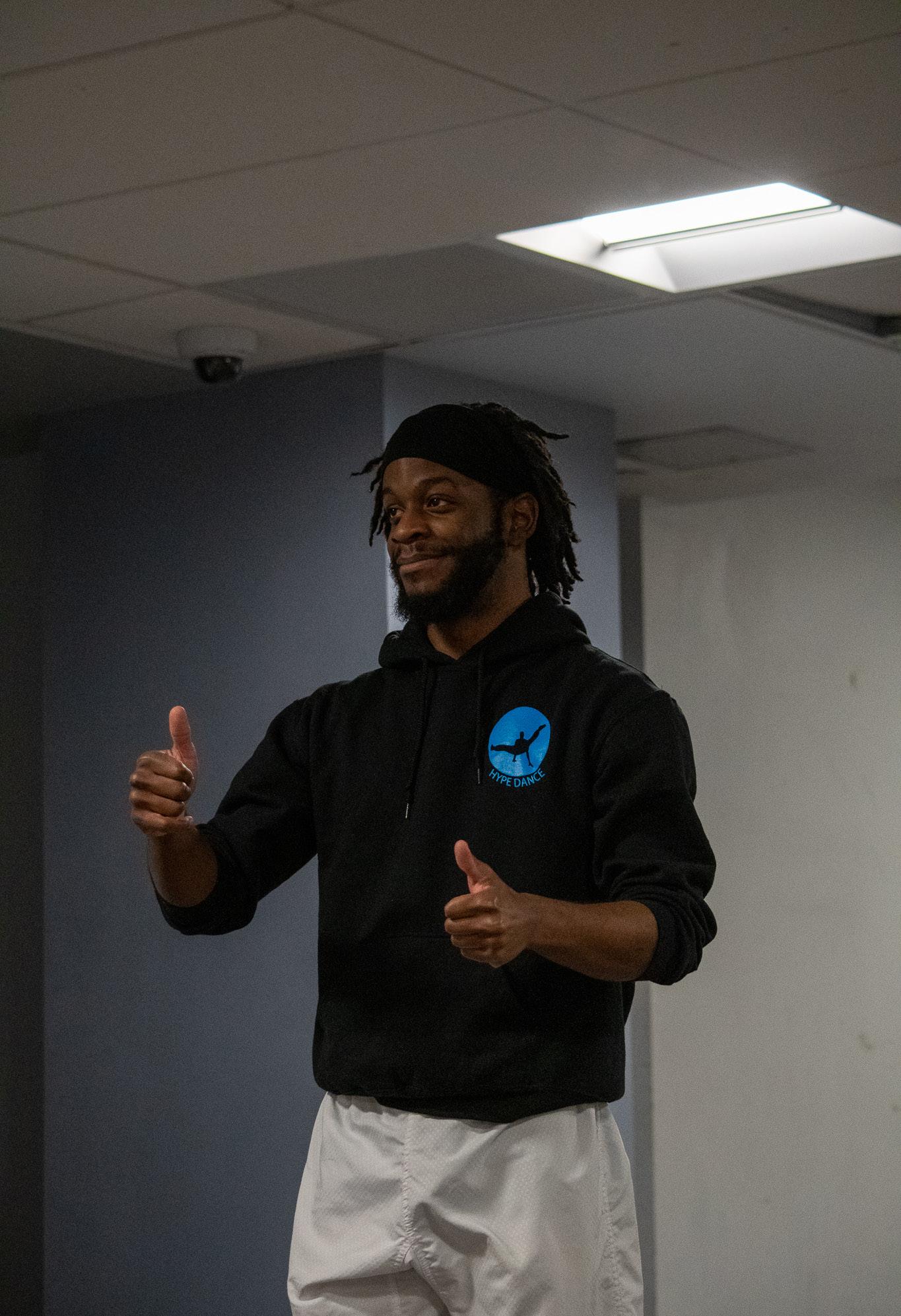
spring 2023 65 Sports
words JULIA ABUZZAHAB
This story contains editorial content in regard to the political opinions of students leaders on campus.
The New York Times recently reported that 19% of people deemed that politics have impacted their familial relationships and friendships. As the political divide grows deeper in the United States, I sat down with two students from different political organizations on campus to discuss how they see the future of our society taking form. Tommy Treacy, a junior in the College of Arts & Sciences and executive vice president of Marquette Student Government, is also vice chair of Marquette College Democrats and national director for College Democrats of America and Olman Chaheine, a junior in the College of Business Administration, president of Marquette College Republicans.
Q: Where do each of you and your political party stand on the topic of inflation?
“I think a common critique of the Democratic Party is it’s a party based on social issues,” Treacy says. “So, I think going forward they are trying to show, ‘Hey we do have an economic policy’ ... So, I think inflation is one place where they’re trying to look into what the Biden administration can do.”
Treacy says there are a lot of “big issues” coming up like the debt ceiling and student debt cancellation. He says there haven’t been many suggestions on how to tackle inflation that are gaining enough momentum in Congress and says “bridging the two-party divide” has been a challenge.
Chaheine says inflation is something he thinks both parties can agree is affecting everybody hard. Chaheine also says the debt ceiling is
something of concern because if the United States runs out of money then we would be headed to a recession.
A solution Chaheine proposed to slow inflation was to raise interest rates as the Federal Reserve is doing everything that it can. Chaheine also suggested cutting down spending.
“It’s really a spending issue in my opinion,” Chaheine says. “And it’s not just Democrats, but it’s also Republicans. I know Donald Trump added a lot to the debt ceiling and they also raised it.”
Q: Where do each of you and your political party stand on the environment?
In the Republican Party, Chaheine says the environment has always been a “taboo” topic to discuss because they believe climate change is a liberal spending policy and made-up.
“I’ve come to realize that ‘Okay, climate change is happening,’ but

Opinions
photo ALEX DEBUHR
66 spring 2023
people aren’t as informed about it as they should be,” Chaheine says.
The Biden administration passed the Inflation Reduction Act, which Chaheine says is to invest in renewable energy. He says the Republican Party’s viewpoint on the act is that it seems like it is raising the costs and prices of everything else.
Chaheine says going about solving the various environmental issues is where differences can be seen between both parties. For the Republican Party, Chaheine says the biggest driving force is money and how much money they invest in the environment.
Although Chaheine says that climate change is occurring, he doesn’t believe it’s as serious of an issue as individuals make it up to be. He says it’s “not at the top of the list” of issues in the United States that need to be addressed.
Treacy disagrees with Chaheine and feels like climate change is a serious problem and where he bases most of his voting off of.
“I feel in a lot of ways we’re already a little bit behind the eightball,” Treacy said. “We’re very fossil fuel reliant.”
Treacy says there are a lot of environmental improvements that need to be made, so he would applaud the Biden administration for trying to make investments and create new technology to combat this problem.
“Forests are being somewhat sustainably logged for the first time, but ... in terms of administration to administration there needs to be some consistency with how we’re regulating and protecting these industries,” Treacy says.
Q: Where do each of you and your political party stand on the upcoming presidential election in 2024?
As of now, Treacy says there are two Democratic options — Marianne Williamson, author, and probably President Joe Biden, which Treacy says he isn’t particularly supportive of either at this point in the race.
However, although Treacy says he’s unsure whether or not there will be a lot of competition within the
Democratic Party, he believes anyone running for the “highest office in the land” should have to work hard for it.
“I think Joe Biden is no opponent to that, but I would like to see him face some real competition. I would like to see him face some younger competition,” Treacy says. “But at the end of the day, I do think he’s had a lot of legislative victories that don’t make him a bad candidate for a second term.”
Some of the main Republican candidates Chaheine says might be campaigning are former President Donald Trump, Nikki Haley, former governor of South Carolina, Ron DeSantis, governor of Florida, former Vice President Mike Pence and possibly Ted Cruz, United States senator.
“The biggest device amongst voters is Donald Trump versus everybody else. Trump is probably the strongest Republican candidate right now running for office,” Chaheine says.
Agreeing with Treacy, Chaheine says if someone is running for the highest position in office, they should have to work hard. He says he’s happy there’s a good competitiveness among those campaigning for office.
Q: What do you think future generations of leaders should be focusing on right now?
Treacy says college-aged individuals should be focused on three things: the environment, access to abortion and voting access.
“I think it’s something [voting access] that’s coming that kind of comes and goes a little bit — how we make sure that everyone can vote while maintaining election security and integrity,” Treacy says.
Chaheine says these individuals should focus on inflation. He believes how much spending power people have is going to diminish more and more.
“Money affects all of us, and so if we can find a way to use money so that it best fits our needs then let’s do that,” Chaheine says.
Q: For the most part, what are topics both of your political parties can agree on?
Although they might disagree on
the solutions, Treacy and Chaheine both say inflation as a topic where both parties can agree is becoming a problem.
Treacy also says that issues around the environment are increasingly becoming a topic both parties also agree on.
In terms of both parties coming together, Treacy says he doesn’t think there’s a magic solution to this.
“It comes down to everyone learning how to respect each other. A more honest, open and respectful dialogue is, at times, politically inconvenient but best for the soul of our nation,” Treacy says.
Chaheine, on the other hand, believes a large-scale event would have to happen in order for both parties to come together.
“I see this being the national debt crisis. If the U.S. defaults, then the parties will have no choice but to come together,” Chaheine says.
Q: Where do you see your parties going in the future?
For Chaheine, he predicts the Republican Party staying the same until there are changes within the presidency. Treacy says he sees the Democratic Party focusing on “kitchen table issues” like paid paternity leave, sick leave and healthcare.
Currently, the U.S. has a partisan Congress — something that Chaheine says isn’t efficient.
“Nothing gets done with a partisan Congress. I would not want this in the future, however, due to difference of opinion, and seeing how people are different, I think we will have a partisan Congress for a long time,” Chaheine says.
Similarly, Treacy is worried about having a partisan Congress in the future.
“It is important that all elected officials stand up for what is right, not what is convenient,” Treacy says.
And while what is right may come with a different answer, depending on who you ask, Chaheine and Treacy have hope for the next generation.
Opinions
spring 2023 67
us us
if not us,
America sees me as a winter wren, small in my existence. There is a reason why winter wrens are not emblems of nations: At first glance, they do not appear powerful. But much like a winter wren, my voice can fill a forest — the kind of song that exclaims, “I am here to stay!”
Before me came generations of Black citizens that used not only their voices, but their actions to move mountains and change the world around them. As John Lewis, a freedom rider, elegantly put it, “If not us, then who? And if not now, when?”
To me, Lewis’ questions go far beyond a call to action. Lewis’ words emphasize that if we, Black Americans, do not become activists in the pursuit of our humanity, we will always be, in the eyes of society, more animal than human. So, we shoulder
Activism, which refers to the policy or action of using vigorous campaigning to bring about political or social change, goes beyond protests and demonstrations. Activism
the responsibility of dismantling barriers that we did not create, educating those around us on history that often forgets our names, contributions and everything else in between. Without knowing, we become the agents of change — finding ourselves at the frontlines of movements and standing up for what we believe — even if that means standing alone.
takes many forms and, in my life, takes the form of writing. When I was younger, I loved to write about how I saw the world and how the world saw me. Back then, my existence wasn’t controversial. The midnight sky skin
it was a rather complex topic to tackle in less than 800 words, I felt it was an issue that could not go unaddressed because my life matters. I knew that if I am not safe on a campus that prides itself on campus safety, then I am not safe anywhere. I have noticed that in situations that deal with safety, especially in the cases of women of color, it becomes a forgotten topic which is why it is important in being a part of the community to talk about these issues.
that covered my body was not a casket and my name didn’t roll off the tongue like a hashtag or headline. In the world I once lived in I was seen for all I was and could be.
James Baldwin, one of the greatest American writers, wrote in his infamous “The Creative Process” piece that “a society must assume that it is stable, but the artist must know, and
But, since growing older, I have realized that the world I once lived in is not the world I exist in at large. There are issues in our society that when unaddressed, presents a major issue for all citizens. Therefore, I have assumed the role of an activist.
In November 2022, I addressed the safety of Black women and other women of color on campus. Although
he must let us know, that there is nothing stable under heaven.” The responsibility of an artist, to me, is the same responsibility of an activist; we must be honest with ourselves about the conditions in which we live in order to change them. Because if not us, then who? And if not now, when?
68 spring 2023
Opinions
words
HOPE MOSES photo FORSTER GOODRICH
activism takes many forms and, in my life, takes the form of writing.”
HOPE MOSES
then who?
who? who?

spring 2023 69
Opinions
mOmenTS Of SilEnCE
Words have so much power in them. They can build someone up, or break them down. Silence carries the same capacity. In some ways, silence has ten times the power of words and can leave a lasting impact or make the outcome worse. Whatever the outcome, silence or words would have the possibility to change that.
Words are used to express strong emotions and feelings and represent power and force. When they come together with other people’s words, they form an everlasting and even sometimes historical impact.
A major example is the Black Lives Matter protests of 2020, which showed that the power of words truly mattered. The protests started after the murder of George Floyd in May 2020. He was killed by police in Minneapolis after being accused of a crime that he did not commit. This sparked nationwide protests with over 26 million people participating.

Eventually, the cop who killed Floyd was pardoned from his job and then he was arrested for first-degree murder. Despite these protests not being able to bring Floyd back, they made a difference in the future of police brutality and racism, and it isn’t over yet.
Sometimes, a big protest isn’t even needed. Silence can take the form of small actions that speak volumes. The act of silence can speak louder than words itself.
A prominent example is when Rosa Parks refused to get up from the
front of the bus for a white person. Her small action led to a massive change. She got arrested upon exiting the bus, but her action led to the Montgomery Bus Boycott until the rule was lifted.
In this case, there was no massive protest or march around the city to make a change. The silence in the action spoke volumes. The boycott showed that despite people being wronged, they will not stop fighting for their rights. Silence means to focus on the actions and those actions showed how there didn’t need to be a massive protest to make a change.
In some cases, like sticking up for someone who was falsely accused, it does make sense to advocate for them and use our voices. To show support, we have to stand our ground and hold people up when they feel like they’re being attacked.
During the midst of the COVID-19 pandemic, the Chinese people had their own silent protest. They were forced to follow the rules of a zero COVID-19 strategy in which they experienced workplace shutdowns, being tracked through their phones and mandatory daily testing. While these were to prevent COVID-19 cases from arising, this was a violation of freedom for Chinese people. Additionally, it has pushed many into joblessness and poverty.
It is very common for schools in the United States to hold a moment of silence before the Pledge of
Allegiance. The purpose of this is to respect everyone’s beliefs and give them a moment to reflect however they do. It’s a form of self-encouragement and strength.
In turn, they had white paper protests. These protests could either be a regular protest or even a silent protest. Protesters would hold a blank white sheet of paper and walk in a group to fight for their freedom being taken away.
The act itself speaks volumes. It allows heads to turn and really make people question why they need to protest. It makes other people feel uncomfortable as they begin to understand what the protest is for.
When we experience something unfair, actions through silence show that we are stronger and that we can grow from that experience. When people grow together in silence, it speaks volumes and shows their strength when they come together.
It’s up to us to decide whether we want to use words or silence to spark a change. Both can make a big impact and what matters is when they are true to our terms. Protests and silence can determine the future, but in the end, it’s all up to you to truly make an impact on yourself, those around you and the world. Both words and silence are forms of action and they can cause a change in the future for the better. Without change, the same misfortunes and unfairness would occur. That change starts with us.
Opinions
words
70 spring 2023
KRISHA PATEL photo KIEFER RUSSEL


SwOrD THE
DouBle-EdgEd
words TRINITY BURGESS
It all started thousands of years ago. First, there was speech. Then, there were cave paintings and many years later, in 1876, the first phone was invented by Alexander Graham Bell. Almost 150 years later, here we are, with iPhones, Chromebooks, smart televisions and more.
We have gained a hyper-connection, the ability to communicate with others across the world with a click of a button and it’s astounding. We have lost the burden of lugging around those five binders, six folders and three books when everything is now
in tiny screens in our pockets, unless you’re a college student.
But there’s another side to this story: We have lost trust in those that are considered inspirational like politicians and celebrities. We have gained the exploitation from false promises, like presidents or wealthy people saying they’ll do one thing but do nothing at all. Then there’s the spread of disinformation, both intentional and unintentional, manipulating everyone with just a few words.
It is a double-edged sword. From just a measly cut of its edge, anyone can be affected. Its sharp blade pierces our hearts, creating a hole filled with doubt and hatred amongst anyone we think is suspicious.
Those that speak from their heart penetrate others’ minds, each letter crashing against one another, making us want to look deeper and deeper into the abyss we call the internet.
That connection is amazing, right? Being able to call a friend that is studying abroad in Guatemala. To hear their voice as clearly as day and talk to them as long as you want.
You’re able to meet your future husband, wife or partner through online dating.
You scroll through different online stores to find that one pair of Nikes that you want and then it pops up as an advertisement on Instagram. What a coincidence, right?
illustration
Opinions 72 spring 2023
ERIN SCHNEIDER
The shine of the sword draws us in as we talk to anyone without having to tell them who we really are. We are able to communicate anonymously with specific people about anything like video games or celebrity drama.
Anonymous, fake names say whatever they want about someone or something without receiving any punishment. It’s so easy to be able to exploit someone for money or pictures because they “like them” or you’re their “friend.” They don’t realize the pain and trauma they put on themselves.
Social media’s gleam has helped so many, yet we descend further into the void of social media. We’re at the point where we can’t see the overwhelming glare of manipulation because we want to “fit in.”
The isolation increases as we stare closer and closer at the screen; we no longer want face-to-face interaction.
But, having everything on my phone or computer is awesome, right?
I don’t have to carry five different binders of paperwork, another three of homework and maybe two more of other random stuff I think I should bring with me.
It’s so convenient for me to just pull out my phone from my pocket or purse. I’m able to get whatever I need from a few words.
The world we live in is astound-
ing. Technology continues to improve quicker and quicker. With change comes risks, not only to our planet, but to our people.
This is a double-edged sword. A name you give to someone or something that causes both harm and good. Although the benefits outweigh the risks, it can hold a lot of power over someone if wielded incorrectly.
Be aware of how bright the shine of the blade is, or one cut could pierce you so deep that both your mind and heart flood with torment and suffering.
Opinions spring 2023 73
THan words LOUDER THan words LOUDER THan words LOUDER THan LOUDER THan words LOUDER THan words LOUDER THan words LOUDER
THan words LOUDER THan words LOUDER THan words LOUDER THan words LOUDER THan words LOUDER THan words LOUDER THan words
LOUDER THan words LOUDER THan words LOUDER THan words LOUDER
THan words LOUDER THan words LOUDER THan words LOUDER THan words LOUDER THan words LOUDER THan words LOUDER THan words
LOUDER THan words LOUDER THan words LOUDER THan words LOUDER
THan words LOUDER THan words LOUDER THan words LOUDER THan words LOUDER THan words LOUDER THan words LOUDER THan words
LOUDER THan words LOUDER THan words LOUDER THan words LOUDER
THan words LOUDER THan words LOUDER THan words LOUDER THan words LOUDER THan words LOUDER THan words LOUDER THan words
LOUDER THan words LOUDER THan words LOUDER THan words LOUDER
THan words LOUDER THan words LOUDER THan words LOUDER THan words LOUDER THan words LOUDER THan words LOUDER THan words
LOUDER THan words LOUDER THan words LOUDER THan words LOUDER THan words LOUDER THan words LOUDER THan words LOUDER THan words LOUDER THan words LOUDER THan words LOUDER THan words
LOUDER THan words LOUDER THan words LOUDER THan words LOUDER
THan words LOUDER THan words LOUDER THan words LOUDER THan words LOUDER THan words LOUDER THan words LOUDER THan words
LOUDER THan words LOUDER THan words LOUDER THan words LOUDER
THan words LOUDER THan words LOUDER THan words LOUDER THan words LOUDER THan words LOUDER THan words LOUDER THan words
LOUDER THan words LOUDER THan words LOUDER THan words LOUDER
THan words LOUDER THan words LOUDER THan words LOUDER THan words LOUDER THan words LOUDER THan words LOUDER THan words
LOUDER THan words LOUDER THan words LOUDER THan words LOUDER THan words LOUDER THan words LOUDER THan words LOUDER THan words LOUDER THan words LOUDER THan words LOUDER THan words
LOUDER THan words LOUDER THan words LOUDER THan words LOUDER THan words LOUDER THan words LOUDER THan words LOUDER THan words LOUDER THan words LOUDER THan words LOUDER THan words
LOUDER THan words LOUDER THan words LOUDER THan words LOUDER THan words LOUDER THan words LOUDER THan words LOUDER THan words LOUDER THan words LOUDER THan words LOUDER THan words
LOUDER THan words LOUDER THan words LOUDER THan words LOUDER THan words LOUDER THan words LOUDER THan words LOUDER THan words LOUDER THan words LOUDER THan words LOUDER THan words
LOUDER THan words LOUDER THan words LOUDER THan words LOUDER THan words LOUDER THan words LOUDER THan words LOUDER THan words LOUDER THan words LOUDER THan words LOUDER THan words
LOUDER THan words LOUDER THan words LOUDER THan words LOUDER THan words LOUDER THan words LOUDER THan words LOUDER THan words LOUDER THan words LOUDER THan words LOUDER THan words
LOUDER THan words LOUDER THan words LOUDER THan words LOUDER THan words LOUDER THan words LOUDER THan words LOUDER THan words LOUDER THan words LOUDER THan words LOUDER THan words
LOUDER THan words LOUDER THan words LOUDER THan words LOUDER
THan words LOUDER THan words LOUDER THan words LOUDER THan words LOUDER THan words LOUDER THan words LOUDER THan words
LOUDER THan words LOUDER THan words LOUDER THan words LOUDER
THan words LOUDER THan words LOUDER THan words LOUDER THan words LOUDER THan words LOUDER THan words LOUDER THan words
LOUDER THan words LOUDER THan words LOUDER THan words LOUDER
THan words LOUDER THan words LOUDER THan words LOUDER THan
74 spring 2023
THan words LOUDER THan words LOUDER THan words LOUDER THan words
LOUDER THan words LOUDER THan words LOUDER THan words LOUDER
THan words LOUDER THan words LOUDER THan words LOUDER THan words LOUDER THan words LOUDER THan words LOUDER THan words
LOUDER THan words LOUDER THan words LOUDER THan words LOUDER
THan words LOUDER THan words LOUDER THan words LOUDER THan words LOUDER THan words LOUDER THan words LOUDER THan words
LOUDER THan words LOUDER THan words LOUDER THan words LOUDER
THan words LOUDER THan words LOUDER THan words LOUDER THan words LOUDER THan words LOUDER THan words LOUDER THan words
LOUDER THan words LOUDER THan words LOUDER THan words LOUDER
THan words LOUDER THan words LOUDER THan words LOUDER THan words LOUDER THan words LOUDER THan words LOUDER THan words
LOUDER THan words LOUDER THan words LOUDER THan words LOUDER
THan words LOUDER THan words LOUDER THan words LOUDER THan words LOUDER THan words LOUDER THan words LOUDER THan words
LOUDER THan words LOUDER THan words LOUDER THan words LOUDER
THan words LOUDER THan words LOUDER THan words LOUDER THan words LOUDER THan words LOUDER THan words LOUDER THan words
LOUDER THan words LOUDER THan words LOUDER THan words LOUDER
THan words LOUDER THan words LOUDER THan words LOUDER THan words LOUDER THan words LOUDER THan words LOUDER THan words
LOUDER THan words LOUDER THan words LOUDER THan words LOUDER
THan words LOUDER THan words LOUDER THan words LOUDER THan words LOUDER THan words LOUDER THan words LOUDER THan words
LOUDER THan words LOUDER THan words LOUDER THan words LOUDER
THan words LOUDER THan words LOUDER THan words LOUDER THan words LOUDER THan words LOUDER THan words LOUDER THan words
LOUDER THan words LOUDER THan words LOUDER THan words LOUDER THan words LOUDER THan words LOUDER THan words LOUDER THan words LOUDER THan words LOUDER THan words LOUDER THan words
LOUDER THan words LOUDER THan words LOUDER THan words LOUDER THan words LOUDER THan words LOUDER THan words LOUDER THan words LOUDER THan words LOUDER THan words LOUDER THan words
LOUDER THan words LOUDER THan words LOUDER THan words LOUDER THan words LOUDER THan words LOUDER THan words LOUDER THan words LOUDER THan words LOUDER THan words LOUDER THan words
LOUDER THan words LOUDER THan words LOUDER THan words LOUDER THan words LOUDER THan words LOUDER THan words LOUDER THan words LOUDER THan words LOUDER THan words LOUDER THan words
LOUDER THan words LOUDER THan words LOUDER THan words LOUDER THan words LOUDER THan words LOUDER THan words LOUDER THan words LOUDER THan words LOUDER THan words LOUDER THan words
LOUDER THan words LOUDER THan words LOUDER THan words LOUDER THan words LOUDER THan words LOUDER THan words LOUDER THan words LOUDER THan words LOUDER THan words LOUDER THan words
LOUDER THan words LOUDER THan words LOUDER THan words LOUDER THan words LOUDER THan words LOUDER THan words LOUDER THan words LOUDER THan words LOUDER THan words LOUDER THan words
LOUDER THan words LOUDER THan words LOUDER THan words LOUDER
THan words LOUDER THan words LOUDER THan words LOUDER THan words LOUDER THan words LOUDER THan words LOUDER THan words
LOUDER THan words LOUDER THan words LOUDER THan words LOUDER
THan words LOUDER THan words LOUDER THan words LOUDER THan words LOUDER THan words LOUDER THan words LOUDER THan words
LOUDER THan words LOUDER THan words LOUDER THan words LOUDER
THan words LOUDER THan words LOUDER THan words LOUDER THan
spring 2023 75



Seaway
PROUDLY PRINTED BY
Printing Company 1609 Western Avenue Green Bay, Wisconsin 54303
The Marquette Wire would like to thank Seaway Printing and Lori Richards for making our dreams come to life.










 Balconies overlook the Milwaukee Riverwalk and the Milwaukee River in the Third Ward district of the city March 9, 2023.
Balconies overlook the Milwaukee Riverwalk and the Milwaukee River in the Third Ward district of the city March 9, 2023.
 photos FORSTER GOODRICH
photos FORSTER GOODRICH






























 photo FORSTER GOODRICH
photo FORSTER GOODRICH











 photos ISABEL BONEBRAKE, FORSTER GOODRICH
photos ISABEL BONEBRAKE, FORSTER GOODRICH


 pictured SEAN O’KEEFE
pictured SEAN O’KEEFE









 pictured CHRISTOPHER MOORE, GRACE KADONSKY, SYLVIA ZMUDZINSKI
pictured CHRISTOPHER MOORE, GRACE KADONSKY, SYLVIA ZMUDZINSKI



 words TREVOR HILSON EMMA KROLL
photos courtesy of MARQUETTE ATHLETICS
words TREVOR HILSON EMMA KROLL
photos courtesy of MARQUETTE ATHLETICS


 words
words
















